
mdream
☁️ The fastest HTML to markdown convertor built with JavaScript. Optimized for LLMs and supports streaming.
Stars: 774
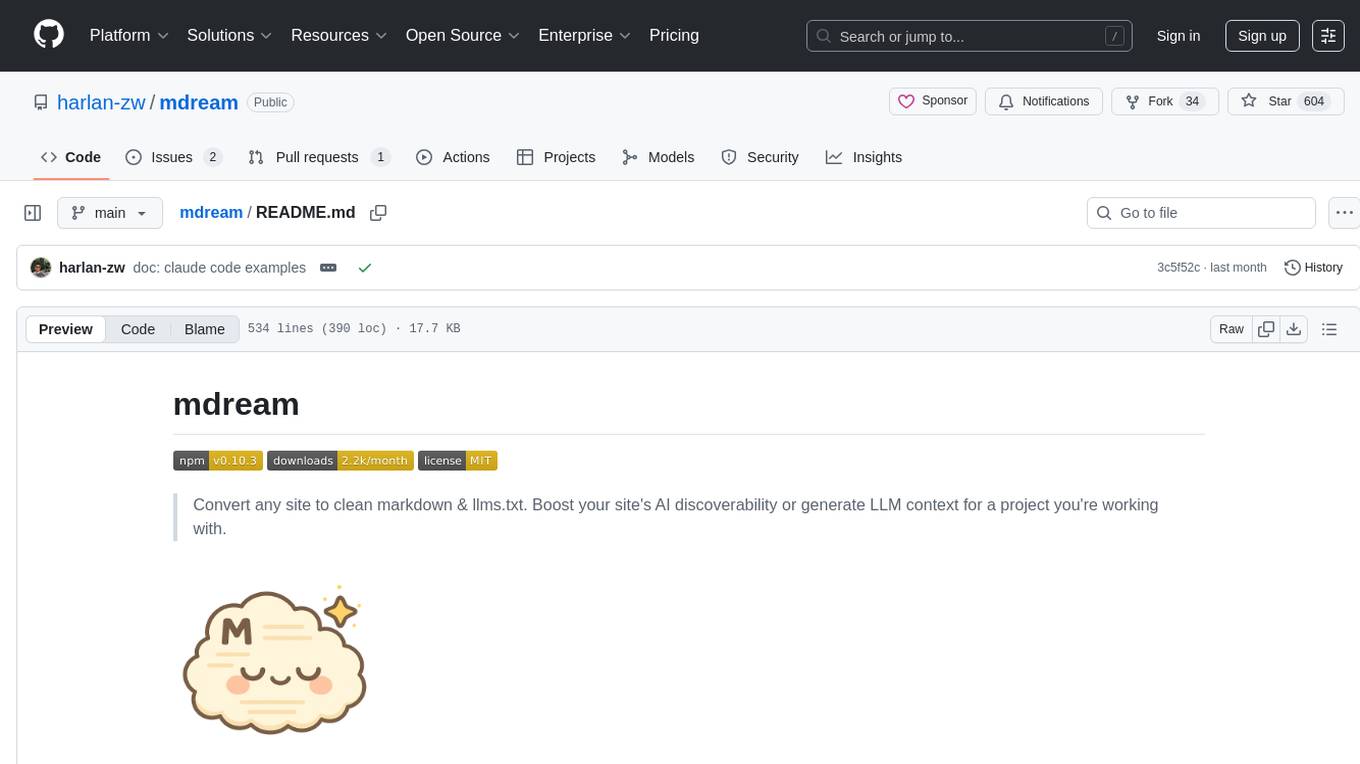
Mdream is a lightweight and user-friendly markdown editor designed for developers and writers. It provides a simple and intuitive interface for creating and editing markdown files with real-time preview. The tool offers syntax highlighting, markdown formatting options, and the ability to export files in various formats. Mdream aims to streamline the writing process and enhance productivity for individuals working with markdown documents.
README:
☁️ The fastest HTML to markdown convertor built with JavaScript. Optimized for LLMs and supports streaming.
|
Made possible by my Sponsor Program 💖 Follow me @harlan_zw 🐦 • Join Discord for help |
- 🧠 Custom built HTML to Markdown Convertor Optimized for LLMs (~50% fewer tokens)
- 🔍 Generates Minimal GitHub Flavored Markdown: Frontmatter, Nested & HTML markup support.
- ✂️ LangChain compatible Markdown Text Splitter for single-pass chunking.
- 🚀 Ultra Fast: Fastest pure JS - 3x faster than Turndown, converts 1.8MB HTML in ~60ms.
- ⚡ Tiny: 6kB gzip, zero dependency core.
- ⚙️ Run anywhere: CLI Crawler, Docker, GitHub Actions, Vite, & more.
- 🔌 Extensible: Plugin system for customizing and extending functionality.
| Input Size | Rust (native) | mdream | Turndown | node-html-markdown |
|---|---|---|---|---|
| 160 KB | 1.4ms | 3.2ms | 11.7ms | 15.0ms |
| 420 KB | 1.9ms | 6.6ms | 14.0ms | 18.1ms |
| 1.8 MB | 21ms | 60ms | 295ms | 28,600ms |
See the Benchmark methodology for more details.
A zero-dependency alternative to Turndown, node-html-markdown, and html-to-markdown, built specifically for LLM input.
Traditional HTML to Markdown converters were not built for LLMs or humans. They tend to be slow and bloated and produce output that's poorly suited for LLMs token usage or for human readability.
Other LLM specific convertors focus on supporting all document formats, resulting in larger bundles and lower quality Markdown output.
Mdream core is a highly optimized primitive for producing Markdown from HTML that is optimized for LLMs.
Mdream ships several packages on top of this to generate LLM artifacts like llms.txt
for your own sites or generate LLM context for any project you're working with.
Mdream is built to run anywhere for all projects and use cases and is available in the following packages:
| Package | Description |
|---|---|
HTML to Markdown converter, use anywhere: browser, edge runtime, node, etc. Includes CLI for stdin conversion and package API. Minimal: no dependencies
|
|
| Use mdream directly in browsers via unpkg/jsDelivr without any build step | |
Site-wide crawler to generate llms.txt artifacts from entire websites |
|
| Pre-built Docker image with Playwright Chrome for containerized website crawling | |
Generate automatic .md for your own Vite sites |
|
Generate automatic .md and llms.txt artifacts generation for Nuxt Sites |
|
Generate .md and llms.txt artifacts from your static .html output |
pnpm add mdream[!TIP] Generate an Agent Skill for this package using skilld:
npx skilld add mdream
import { htmlToMarkdown } from 'mdream'
const markdown = htmlToMarkdown('<h1>Hello World</h1>')
console.log(markdown) // # Hello WorldCore Functions:
- htmlToMarkdown - Convert HTML to Markdown
- streamHtmlToMarkdown - Stream HTML to Markdown
- parseHtml - Parse HTML to AST
See the API Usage section for complete details.
Need something that works in the browser or an edge runtime? Use Mdream.
The @mdream/crawl package crawls an entire site generating LLM artifacts using mdream for Markdown conversion.
- llms.txt: A consolidated text file optimized for LLM consumption.
- llms-full.txt: An extended format with comprehensive metadata and full content.
- Individual Markdown Files: Each crawled page is saved as a separate Markdown file in the
md/directory.
# Interactive
npx @mdream/crawl
# Simple
npx @mdream/crawl https://harlanzw.com
# Glob patterns
npx @mdream/crawl "https://nuxt.com/docs/getting-started/**"
# Get help
npx @mdream/crawl -h🤖 Analyze Websites with AI Tools
Feed website content directly to Claude or other AI tools:
# Analyze entire site with Claude
npx @mdream/crawl harlanzw.com
cat output/llms-full.txt | claude -p "summarize this website"
# Analyze specific documentation
npx @mdream/crawl "https://nuxt.com/docs/getting-started/**"
cat output/llms-full.txt | claude -p "explain key concepts"
# Analyze JavaScript/SPA sites (React, Vue, Angular)
npx -p playwright -p @mdream/crawl crawl https://spa-site.com --driver playwright
cat output/llms-full.txt | claude -p "what features does this app have"
# Convert single page
curl -s https://en.wikipedia.org/wiki/Markdown | npx mdream --origin https://en.wikipedia.org | claude -p "summarize"🌐 Make Your Site AI-Discoverable
Generate llms.txt to help AI tools understand your site:
# Static sites
npx @mdream/crawl https://yoursite.com
# JavaScript/SPA sites (React, Vue, Angular)
npx -p playwright -p @mdream/crawl crawl https://spa-site.com --driver playwrightOutputs:
-
output/llms.txt- Optimized for LLM consumption -
output/llms-full.txt- Complete content with metadata -
output/md/- Individual markdown files per page
🗄️ Build RAG Systems from Websites
Crawl websites and generate embeddings for vector databases:
import { crawlAndGenerate } from '@mdream/crawl'
import { embed } from 'ai'
import { withMinimalPreset } from 'mdream/preset/minimal'
import { htmlToMarkdownSplitChunks } from 'mdream/splitter'
const { createTransformersJS } = await import('@built-in-ai/transformers-js')
const embeddingModel = createTransformersJS().textEmbeddingModel('Xenova/bge-base-en-v1.5')
const embeddings = []
await crawlAndGenerate({
urls: ['https://example.com'],
onPage: async ({ url, html, title, origin }) => {
const chunks = htmlToMarkdownSplitChunks(html, withMinimalPreset({
chunkSize: 1000,
chunkOverlap: 200,
origin,
}))
for (const chunk of chunks) {
const { embedding } = await embed({ model: embeddingModel, value: chunk.content })
embeddings.push({ url, title, content: chunk.content, embedding })
}
},
})
// Save to vector database: await saveToVectorDB(embeddings)✂️ Extract Specific Content from Pages
Pull headers, images, or other elements during conversion:
import { htmlToMarkdown } from 'mdream'
import { extractionPlugin } from 'mdream/plugins'
const headers = []
const images = []
htmlToMarkdown(html, {
plugins: [
extractionPlugin({
'h1, h2, h3': el => headers.push(el.textContent),
'img[src]': el => images.push({ src: el.attributes.src, alt: el.attributes.alt })
})
]
})⚡ Optimize Token Usage With Cleaner Content
Remove ads, navigation, and unwanted elements to reduce token costs:
import { createPlugin, ELEMENT_NODE, htmlToMarkdown } from 'mdream'
const cleanPlugin = createPlugin({
beforeNodeProcess({ node }) {
if (node.type === ELEMENT_NODE) {
const cls = node.attributes?.class || ''
if (cls.includes('ad') || cls.includes('nav') || node.name === 'script')
return { skip: true }
}
}
})
htmlToMarkdown(html, { plugins: [cleanPlugin] })Mdream is much more minimal than Mdream Crawl. It provides a CLI designed to work exclusively with Unix pipes, providing flexibility and freedom to integrate with other tools.
Pipe Site to Markdown
Fetches the Markdown Wikipedia page and converts it to Markdown preserving the original links and images.
curl -s https://en.wikipedia.org/wiki/Markdown \
| npx mdream --origin https://en.wikipedia.org --preset minimal \
| tee streaming.mdTip: The --origin flag will fix relative image and link paths
Local File to Markdown
Converts a local HTML file to a Markdown file, using tee to write the output to a file and display it in the terminal.
cat index.html \
| npx mdream --preset minimal \
| tee streaming.md-
--origin <url>: Base URL for resolving relative links and images -
--preset <preset>: Conversion presets: minimal -
--help: Display help information -
--version: Display version information
Run @mdream/crawl with Playwright Chrome pre-installed for website crawling in containerized environments.
# Quick start
docker run harlanzw/mdream:latest site.com/docs/**
# Interactive mode
docker run -it harlanzw/mdream:latest
# Using Playwright for JavaScript sites
docker run harlanzw/mdream:latest spa-site.com --driver playwrightAvailable Images:
-
harlanzw/mdream:latest- Latest stable release -
ghcr.io/harlan-zw/mdream:latest- GitHub Container Registry
See DOCKER.md for complete usage, configuration, and building instructions.
pnpm add @mdream/actionSee the GitHub Actions README for usage and configuration.
pnpm install @mdream/viteSee the Vite README for usage and configuration.
pnpm add @mdream/nuxtSee the Nuxt Module README for usage and configuration.
For browser environments, you can use mdream directly via CDN without any build step:
<!DOCTYPE html>
<html>
<head>
<script src="https://unpkg.com/mdream/dist/iife.js"></script>
</head>
<body>
<script>
// Convert HTML to Markdown in the browser
const html = '<h1>Hello World</h1><p>This is a paragraph.</p>'
const markdown = window.mdream.htmlToMarkdown(html)
console.log(markdown) // # Hello World\n\nThis is a paragraph.
</script>
</body>
</html>CDN Options:
-
unpkg:
https://unpkg.com/mdream/dist/iife.js -
jsDelivr:
https://cdn.jsdelivr.net/npm/mdream/dist/iife.js
- ultrahtml: HTML parsing inspiration
Licensed under the MIT license.
For Tasks:
Click tags to check more tools for each tasksFor Jobs:
Alternative AI tools for mdream
Similar Open Source Tools

mdream
Mdream is a lightweight and user-friendly markdown editor designed for developers and writers. It provides a simple and intuitive interface for creating and editing markdown files with real-time preview. The tool offers syntax highlighting, markdown formatting options, and the ability to export files in various formats. Mdream aims to streamline the writing process and enhance productivity for individuals working with markdown documents.
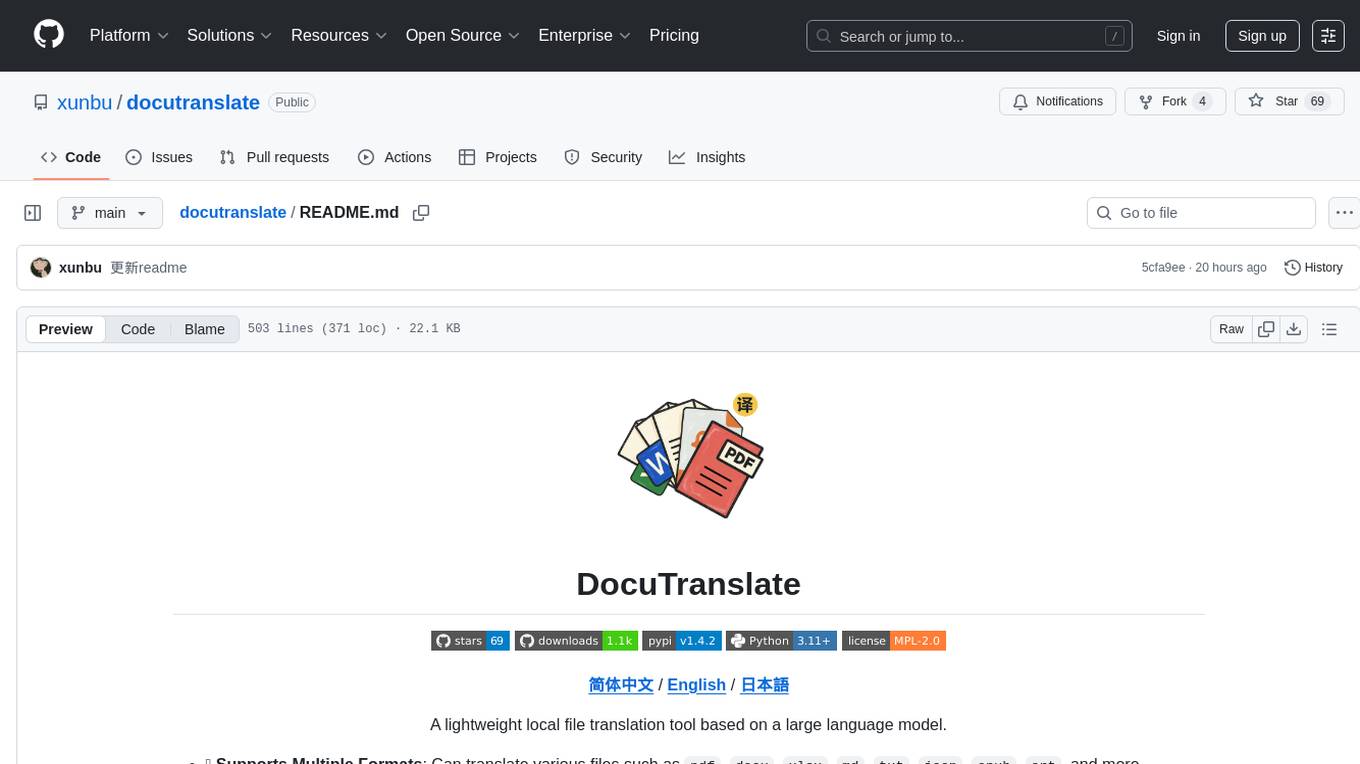
docutranslate
Docutranslate is a versatile tool for translating documents efficiently. It supports multiple file formats and languages, making it ideal for businesses and individuals needing quick and accurate translations. The tool uses advanced algorithms to ensure high-quality translations while maintaining the original document's formatting. With its user-friendly interface, Docutranslate simplifies the translation process and saves time for users. Whether you need to translate legal documents, technical manuals, or personal letters, Docutranslate is the go-to solution for all your document translation needs.
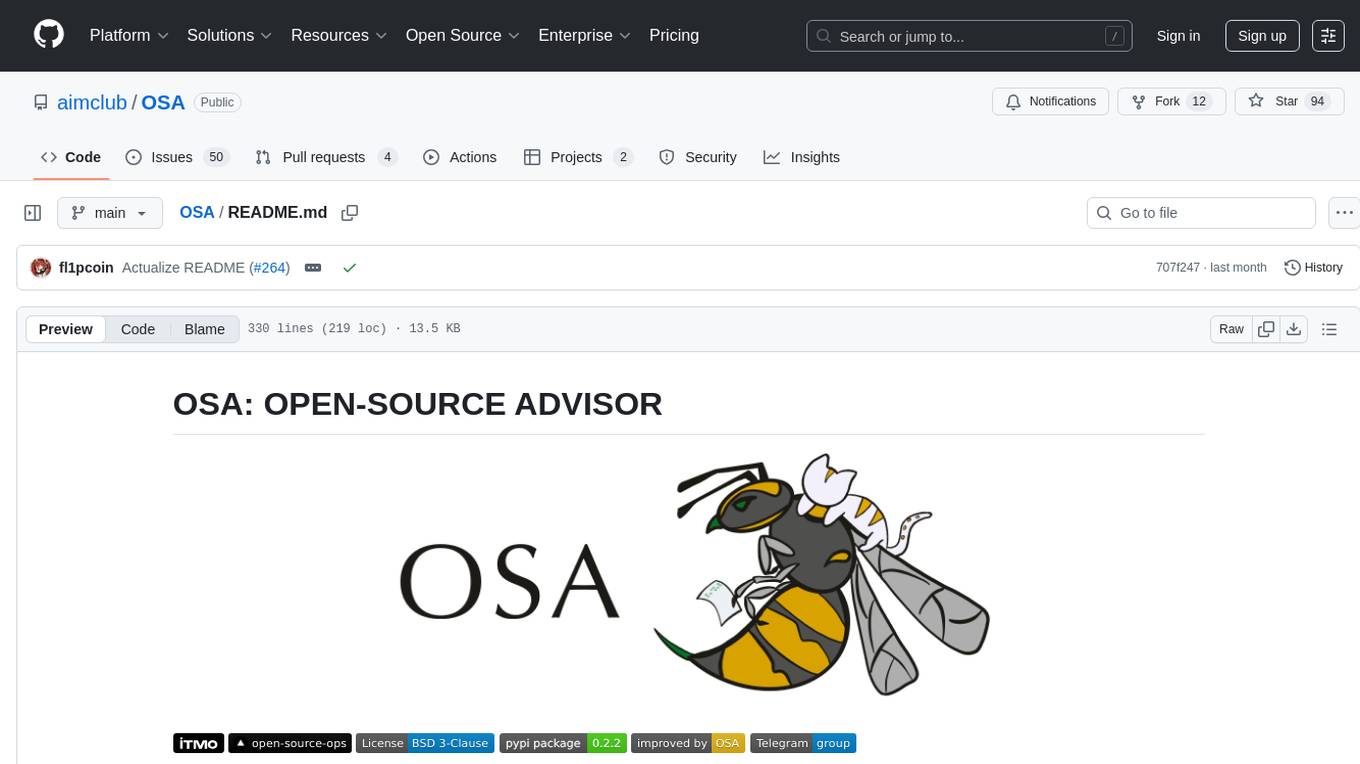
OSA
OSA (Open-Source-Advisor) is a tool designed to improve the quality of scientific open source projects by automating the generation of README files, documentation, CI/CD scripts, and providing advice and recommendations for repositories. It supports various LLMs accessible via API, local servers, or osa_bot hosted on ITMO servers. OSA is currently under development with features like README file generation, documentation generation, automatic implementation of changes, LLM integration, and GitHub Action Workflow generation. It requires Python 3.10 or higher and tokens for GitHub/GitLab/Gitverse and LLM API key. Users can install OSA using PyPi or build from source, and run it using CLI commands or Docker containers.
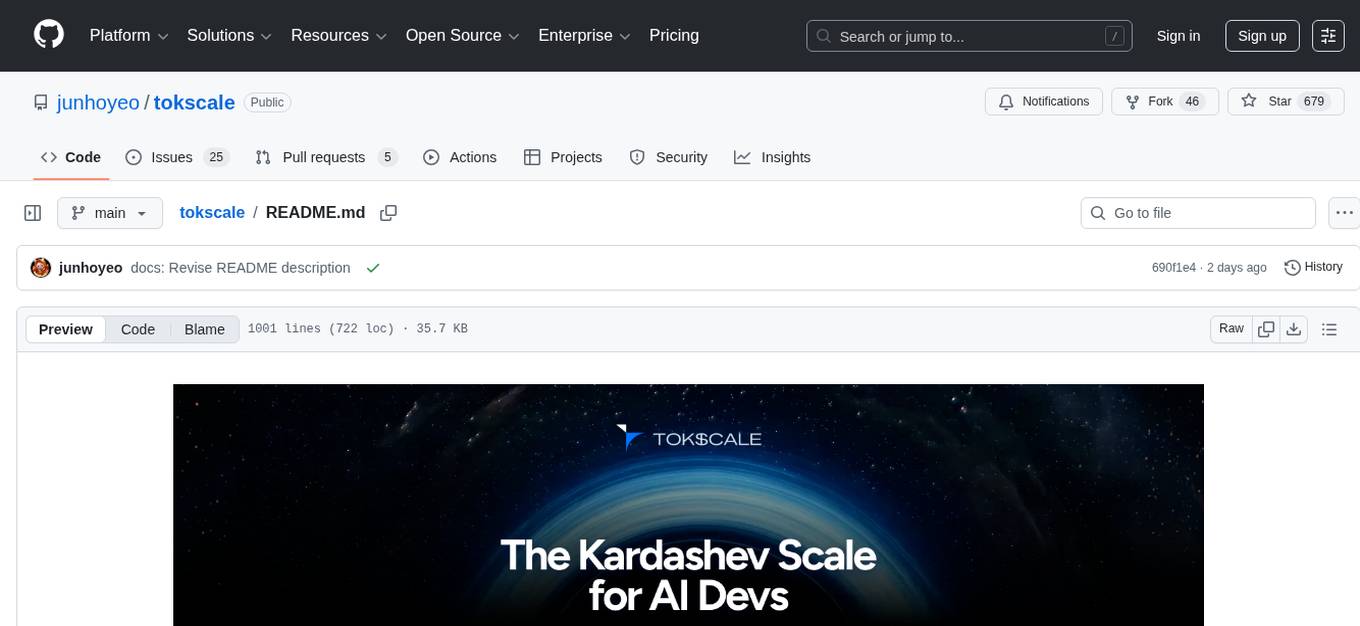
tokscale
Tokscale is a high-performance CLI tool and visualization dashboard for tracking token usage and costs across multiple AI coding agents. It helps monitor and analyze token consumption from various AI coding tools, providing real-time pricing calculations using LiteLLM's pricing data. Inspired by the Kardashev scale, Tokscale measures token consumption as users scale the ranks of AI-augmented development. It offers interactive TUI mode, multi-platform support, real-time pricing, detailed breakdowns, web visualization, flexible filtering, and social platform features.
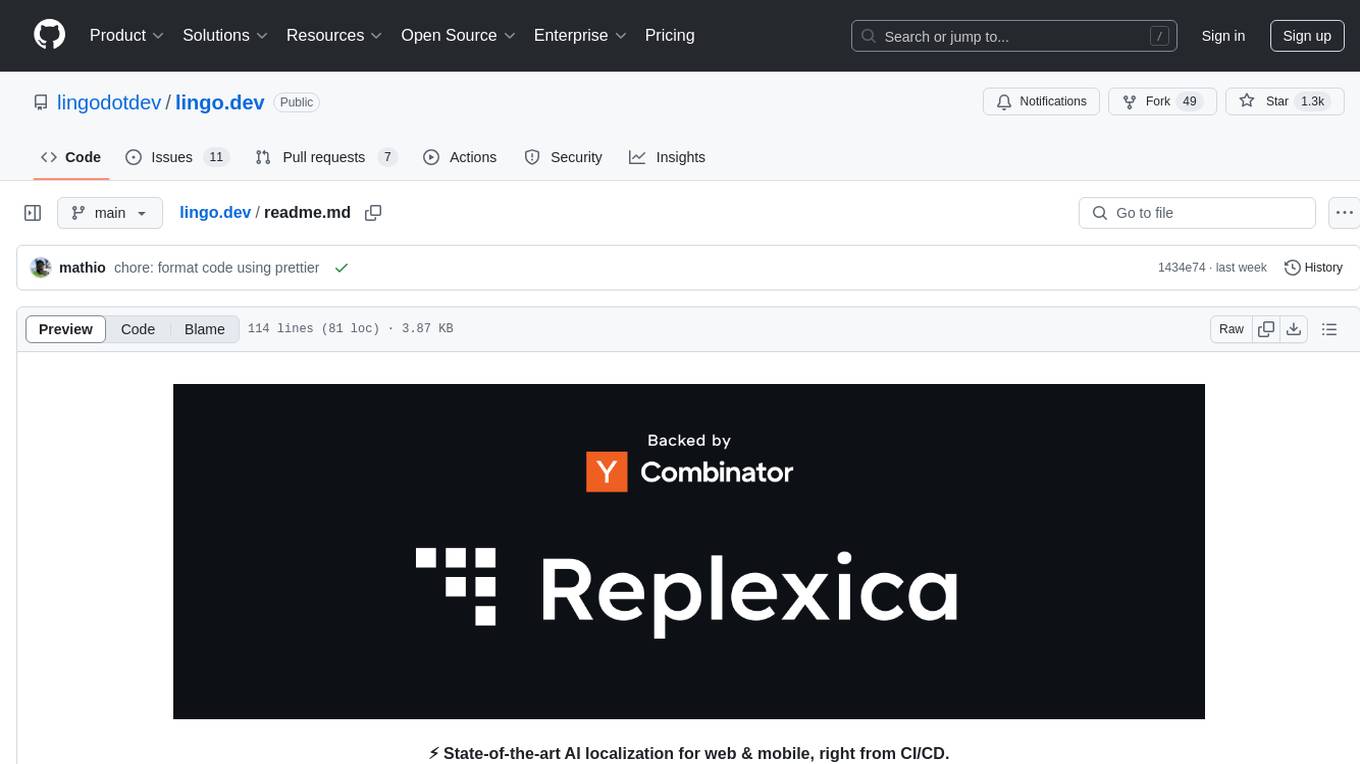
lingo.dev
Replexica AI automates software localization end-to-end, producing authentic translations instantly across 60+ languages. Teams can do localization 100x faster with state-of-the-art quality, reaching more paying customers worldwide. The tool offers a GitHub Action for CI/CD automation and supports various formats like JSON, YAML, CSV, and Markdown. With lightning-fast AI localization, auto-updates, native quality translations, developer-friendly CLI, and scalability for startups and enterprise teams, Replexica is a top choice for efficient and effective software localization.
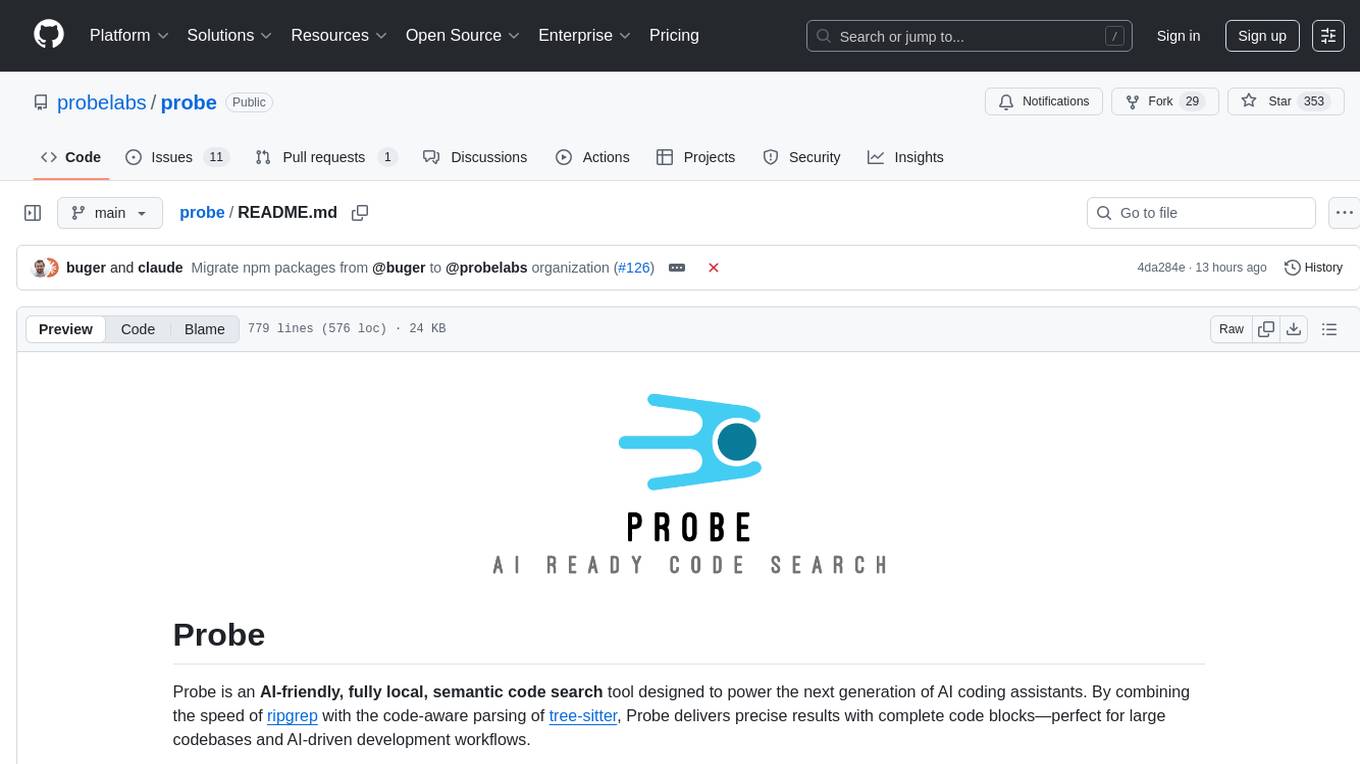
probe
Probe is an AI-friendly, fully local, semantic code search tool designed to power the next generation of AI coding assistants. It combines the speed of ripgrep with the code-aware parsing of tree-sitter to deliver precise results with complete code blocks, making it perfect for large codebases and AI-driven development workflows. Probe supports various features like AI-friendly code extraction, fully local operation without external APIs, fast scanning of large codebases, accurate code structure parsing, re-rankers and NLP methods for better search results, multi-language support, interactive AI chat mode, and flexibility to run as a CLI tool, MCP server, or interactive AI chat.
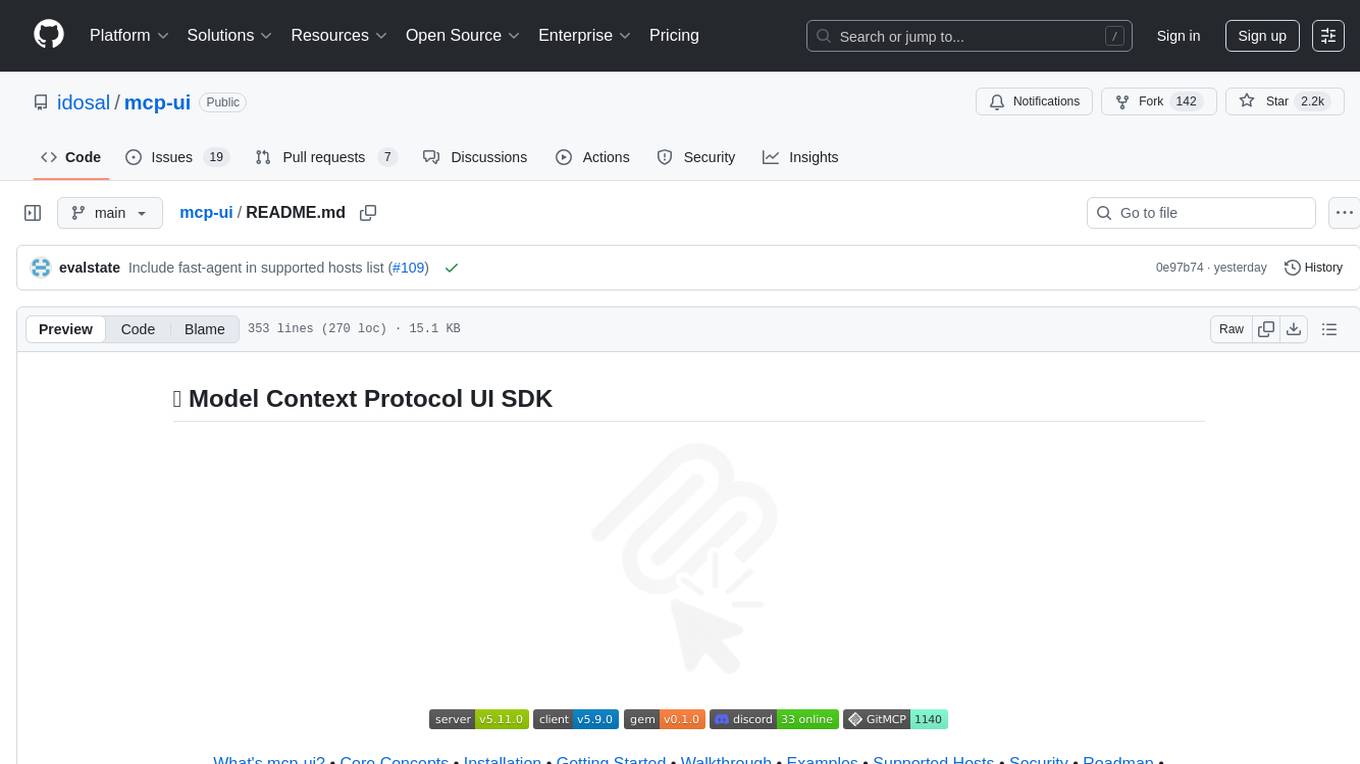
mcp-ui
mcp-ui is a collection of SDKs that bring interactive web components to the Model Context Protocol (MCP). It allows servers to define reusable UI snippets, render them securely in the client, and react to their actions in the MCP host environment. The SDKs include @mcp-ui/server (TypeScript) for generating UI resources on the server, @mcp-ui/client (TypeScript) for rendering UI components on the client, and mcp_ui_server (Ruby) for generating UI resources in a Ruby environment. The project is an experimental community playground for MCP UI ideas, with rapid iteration and enhancements.
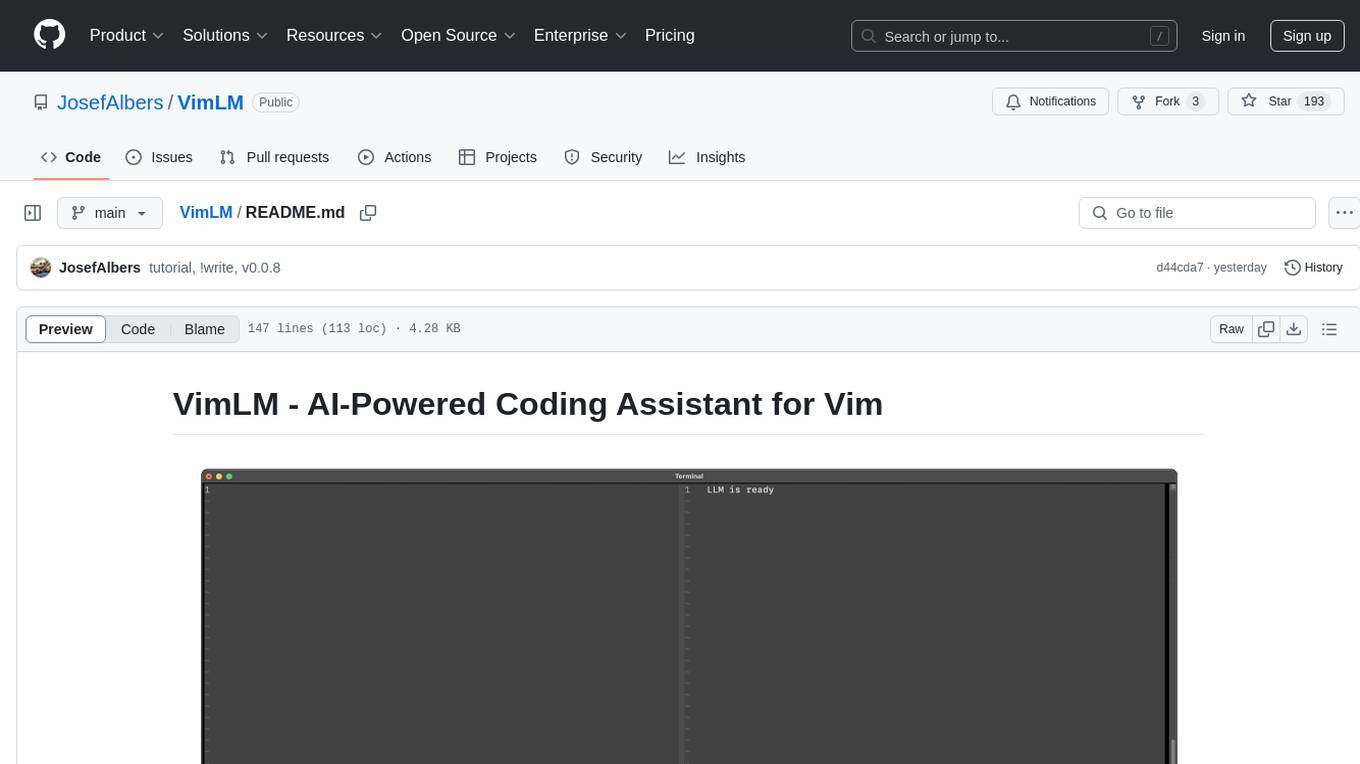
VimLM
VimLM is an AI-powered coding assistant for Vim that integrates AI for code generation, refactoring, and documentation directly into your Vim workflow. It offers native Vim integration with split-window responses and intuitive keybindings, offline first execution with MLX-compatible models, contextual awareness with seamless integration with codebase and external resources, conversational workflow for iterating on responses, project scaffolding for generating and deploying code blocks, and extensibility for creating custom LLM workflows with command chains.
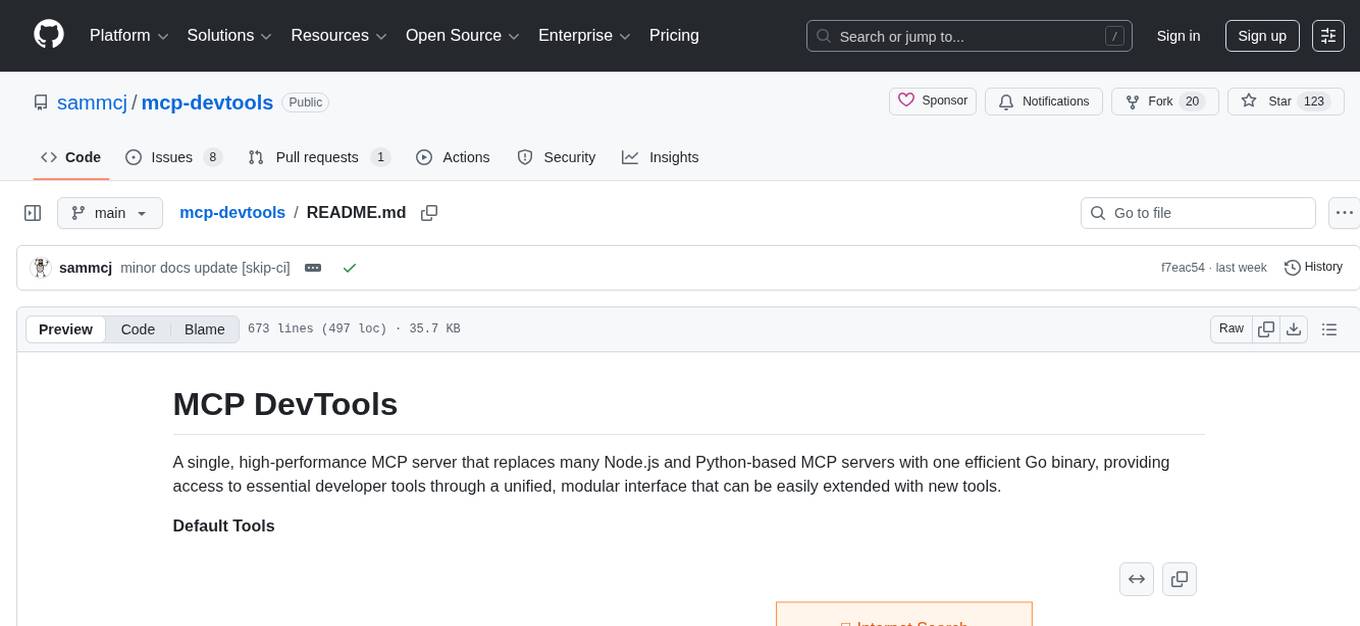
mcp-devtools
MCP DevTools is a high-performance server written in Go that replaces multiple Node.js and Python-based servers. It provides access to essential developer tools through a unified, modular interface. The server is efficient, with minimal memory footprint and fast response times. It offers a comprehensive tool suite for agentic coding, including 20+ essential developer agent tools. The tool registry allows for easy addition of new tools. The server supports multiple transport modes, including STDIO, HTTP, and SSE. It includes a security framework for multi-layered protection and a plugin system for adding new tools.
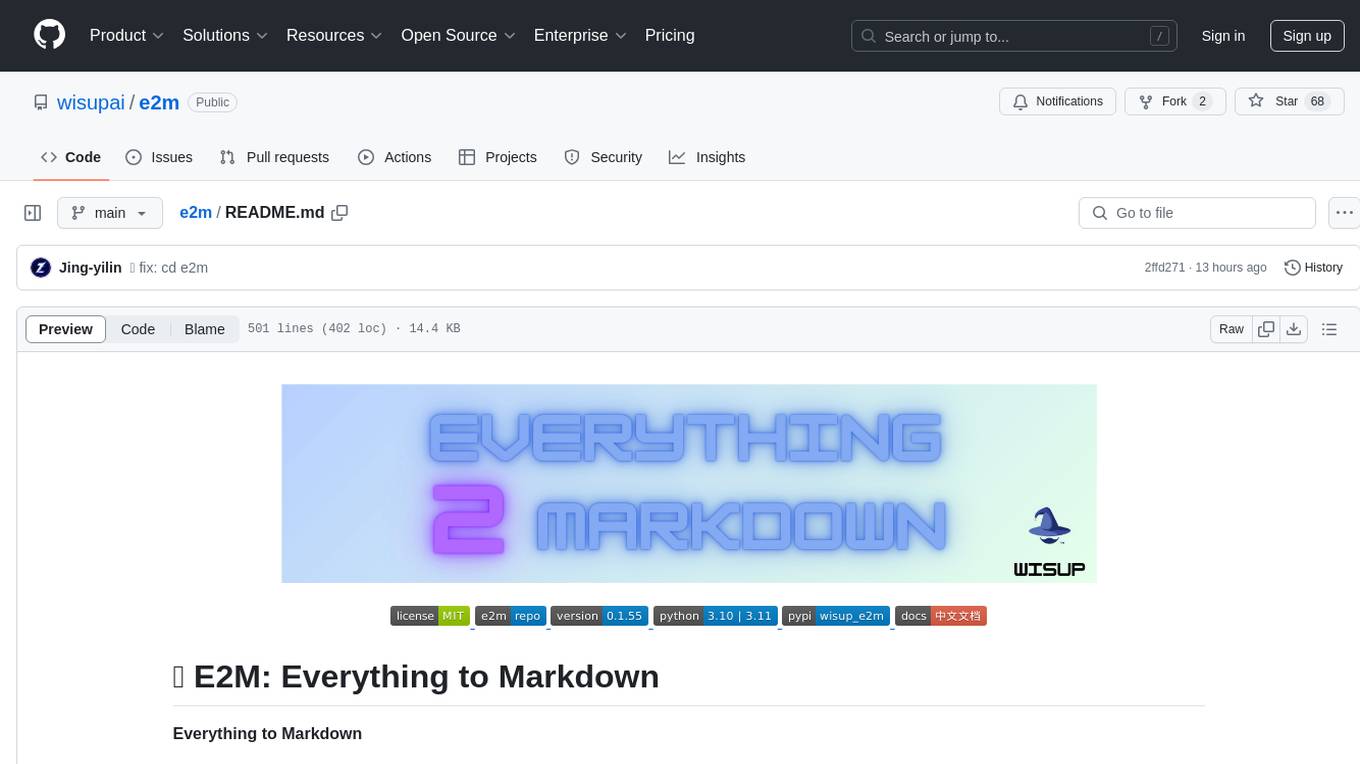
e2m
E2M is a Python library that can parse and convert various file types into Markdown format. It supports the conversion of multiple file formats, including doc, docx, epub, html, htm, url, pdf, ppt, pptx, mp3, and m4a. The ultimate goal of the E2M project is to provide high-quality data for Retrieval-Augmented Generation (RAG) and model training or fine-tuning. The core architecture consists of a Parser responsible for parsing various file types into text or image data, and a Converter responsible for converting text or image data into Markdown format.
pixeltable
Pixeltable is a Python library designed for ML Engineers and Data Scientists to focus on exploration, modeling, and app development without the need to handle data plumbing. It provides a declarative interface for working with text, images, embeddings, and video, enabling users to store, transform, index, and iterate on data within a single table interface. Pixeltable is persistent, acting as a database unlike in-memory Python libraries such as Pandas. It offers features like data storage and versioning, combined data and model lineage, indexing, orchestration of multimodal workloads, incremental updates, and automatic production-ready code generation. The tool emphasizes transparency, reproducibility, cost-saving through incremental data changes, and seamless integration with existing Python code and libraries.
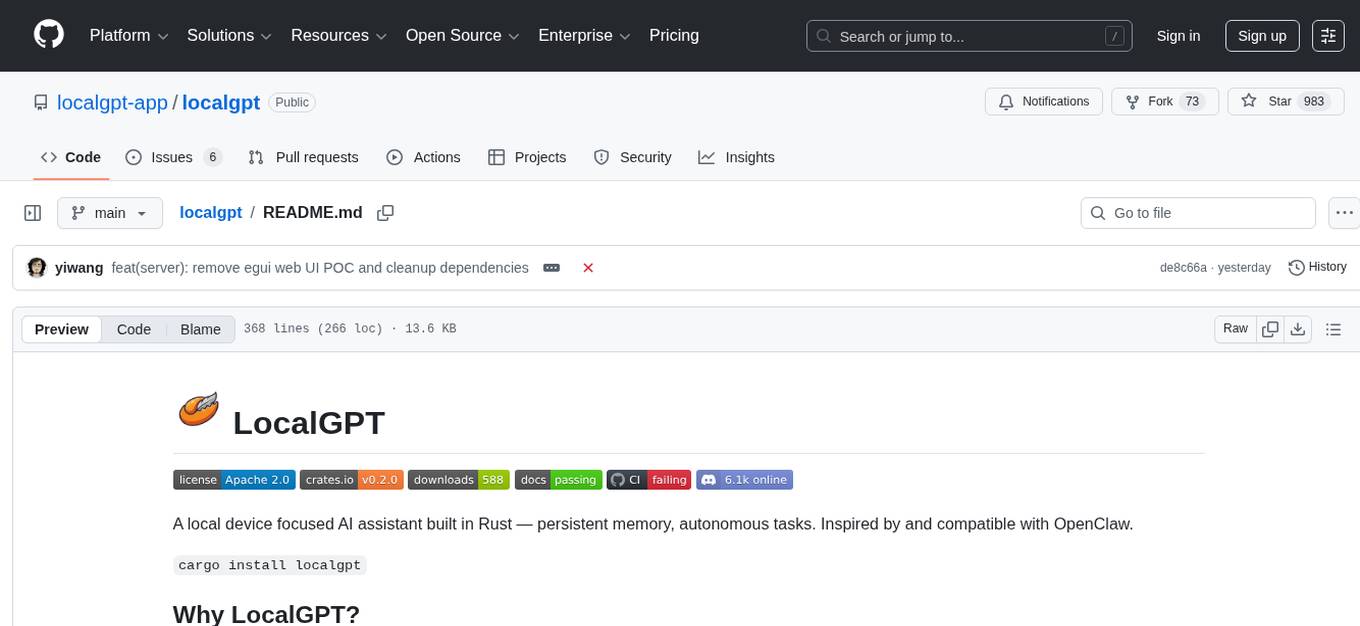
localgpt
LocalGPT is a local device focused AI assistant built in Rust, providing persistent memory and autonomous tasks. It runs entirely on your machine, ensuring your memory data stays private. The tool offers a markdown-based knowledge store with full-text and semantic search capabilities, hybrid web search, and multiple interfaces including CLI, web UI, desktop GUI, and Telegram bot. It supports multiple LLM providers, is OpenClaw compatible, and offers defense-in-depth security features such as signed policy files, kernel-enforced sandbox, and prompt injection defenses. Users can configure web search providers, use OAuth subscription plans, and access the tool from Telegram for chat, tool use, and memory support.
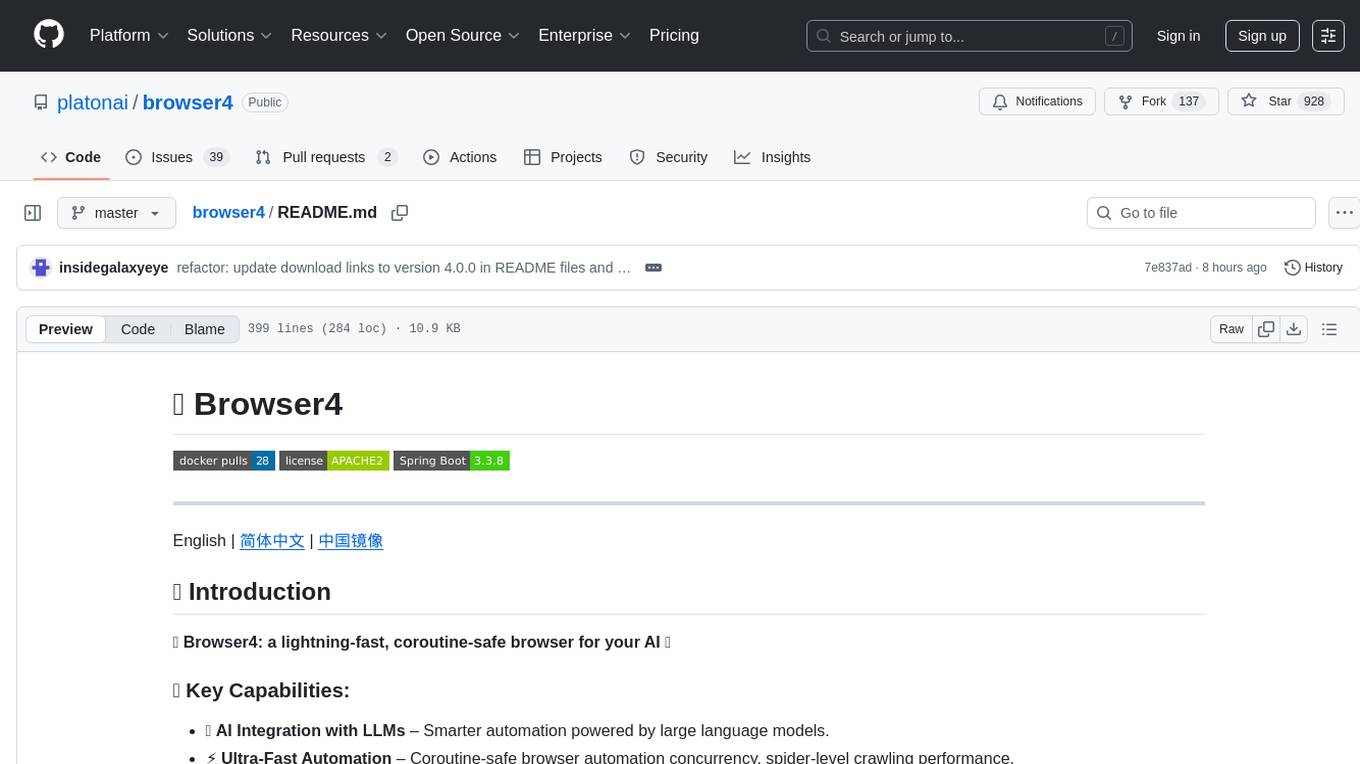
browser4
Browser4 is a lightning-fast, coroutine-safe browser designed for AI integration with large language models. It offers ultra-fast automation, deep web understanding, and powerful data extraction APIs. Users can automate the browser, extract data at scale, and perform tasks like summarizing products, extracting product details, and finding specific links. The tool is developer-friendly, supports AI-powered automation, and provides advanced features like X-SQL for precise data extraction. It also offers RPA capabilities, browser control, and complex data extraction with X-SQL. Browser4 is suitable for web scraping, data extraction, automation, and AI integration tasks.
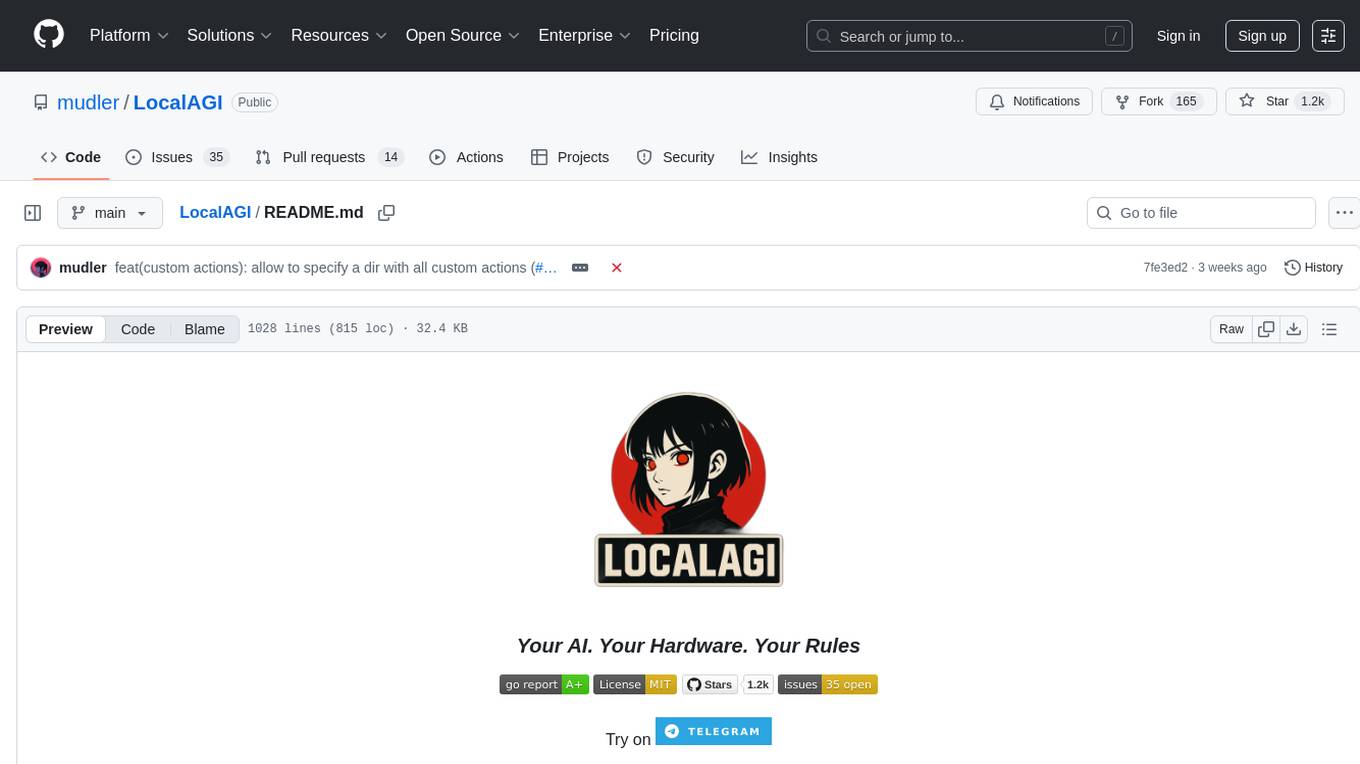
LocalAGI
LocalAGI is a powerful, self-hostable AI Agent platform that allows you to design AI automations without writing code. It provides a complete drop-in replacement for OpenAI's Responses APIs with advanced agentic capabilities. With LocalAGI, you can create customizable AI assistants, automations, chat bots, and agents that run 100% locally, without the need for cloud services or API keys. The platform offers features like no-code agents, web-based interface, advanced agent teaming, connectors for various platforms, comprehensive REST API, short & long-term memory capabilities, planning & reasoning, periodic tasks scheduling, memory management, multimodal support, extensible custom actions, fully customizable models, observability, and more.
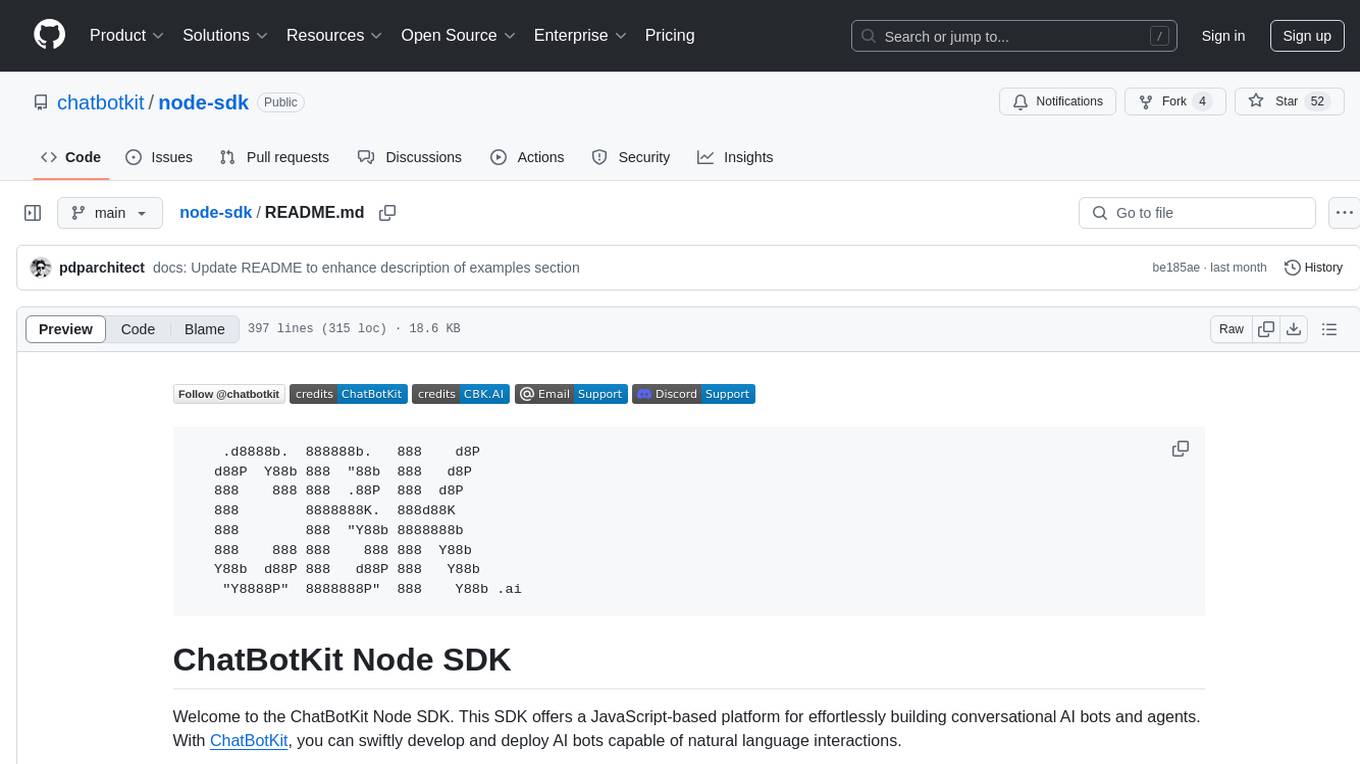
node-sdk
The ChatBotKit Node SDK is a JavaScript-based platform for building conversational AI bots and agents. It offers easy setup, serverless compatibility, modern framework support, customizability, and multi-platform deployment. With capabilities like multi-modal and multi-language support, conversation management, chat history review, custom datasets, and various integrations, this SDK enables users to create advanced chatbots for websites, mobile apps, and messaging platforms.
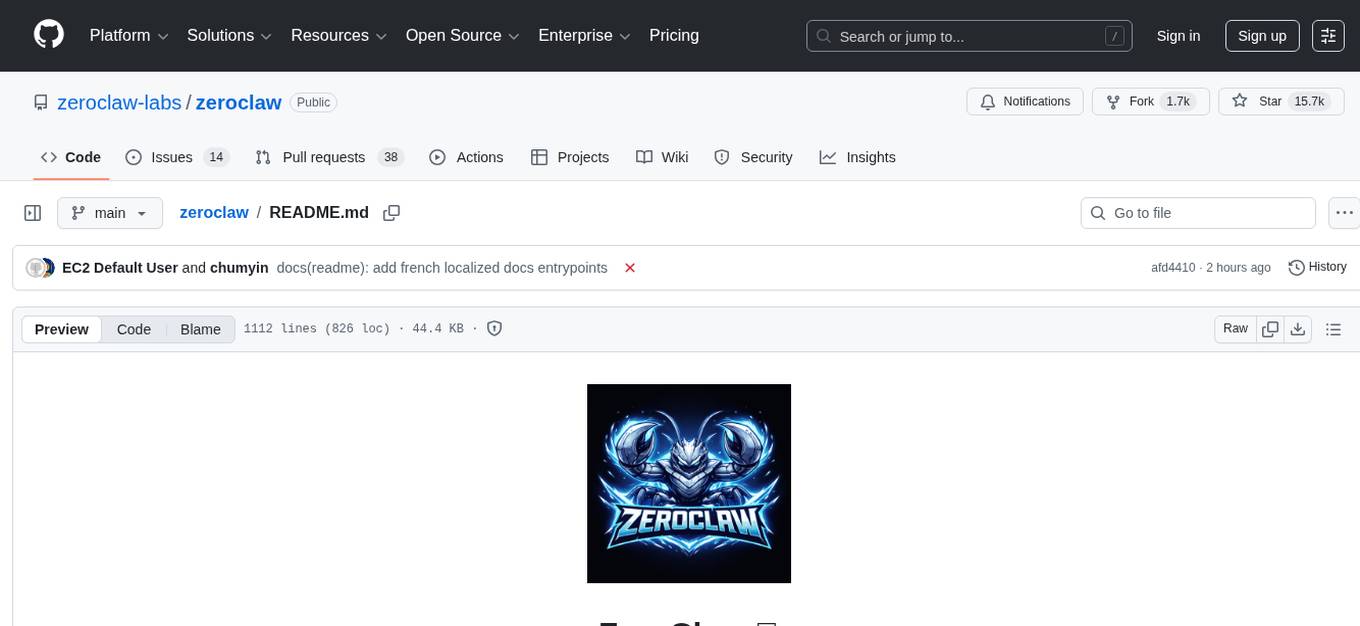
zeroclaw
ZeroClaw is a fast, small, and fully autonomous AI assistant infrastructure built with Rust. It features a lean runtime, cost-efficient deployment, fast cold starts, and a portable architecture. It is secure by design, fully swappable, and supports OpenAI-compatible provider support. The tool is designed for low-cost boards and small cloud instances, with a memory footprint of less than 5MB. It is suitable for tasks like deploying AI assistants, swapping providers/channels/tools, and pluggable everything.
For similar tasks

mdream
Mdream is a lightweight and user-friendly markdown editor designed for developers and writers. It provides a simple and intuitive interface for creating and editing markdown files with real-time preview. The tool offers syntax highlighting, markdown formatting options, and the ability to export files in various formats. Mdream aims to streamline the writing process and enhance productivity for individuals working with markdown documents.
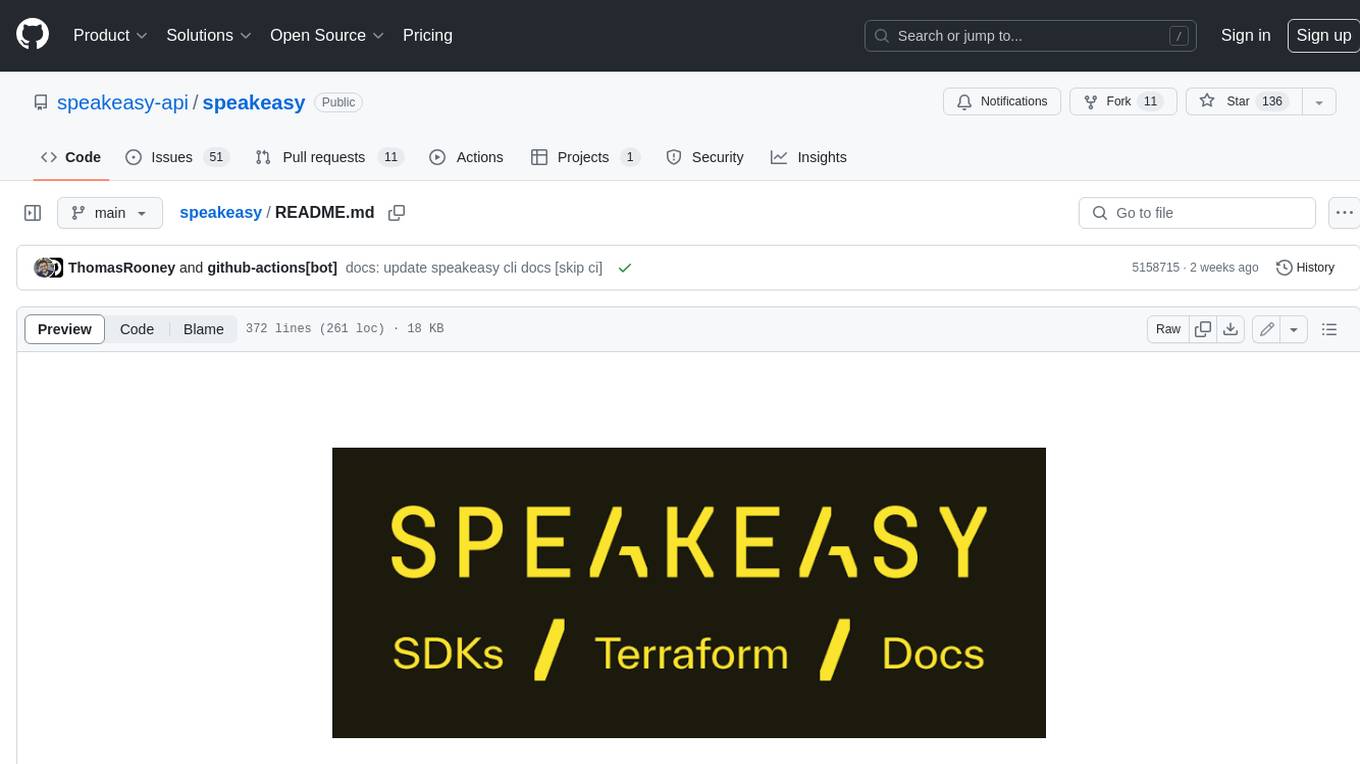
speakeasy
Speakeasy is a tool that helps developers create production-quality SDKs, Terraform providers, documentation, and more from OpenAPI specifications. It supports a wide range of languages, including Go, Python, TypeScript, Java, and C#, and provides features such as automatic maintenance, type safety, and fault tolerance. Speakeasy also integrates with popular package managers like npm, PyPI, Maven, and Terraform Registry for easy distribution.
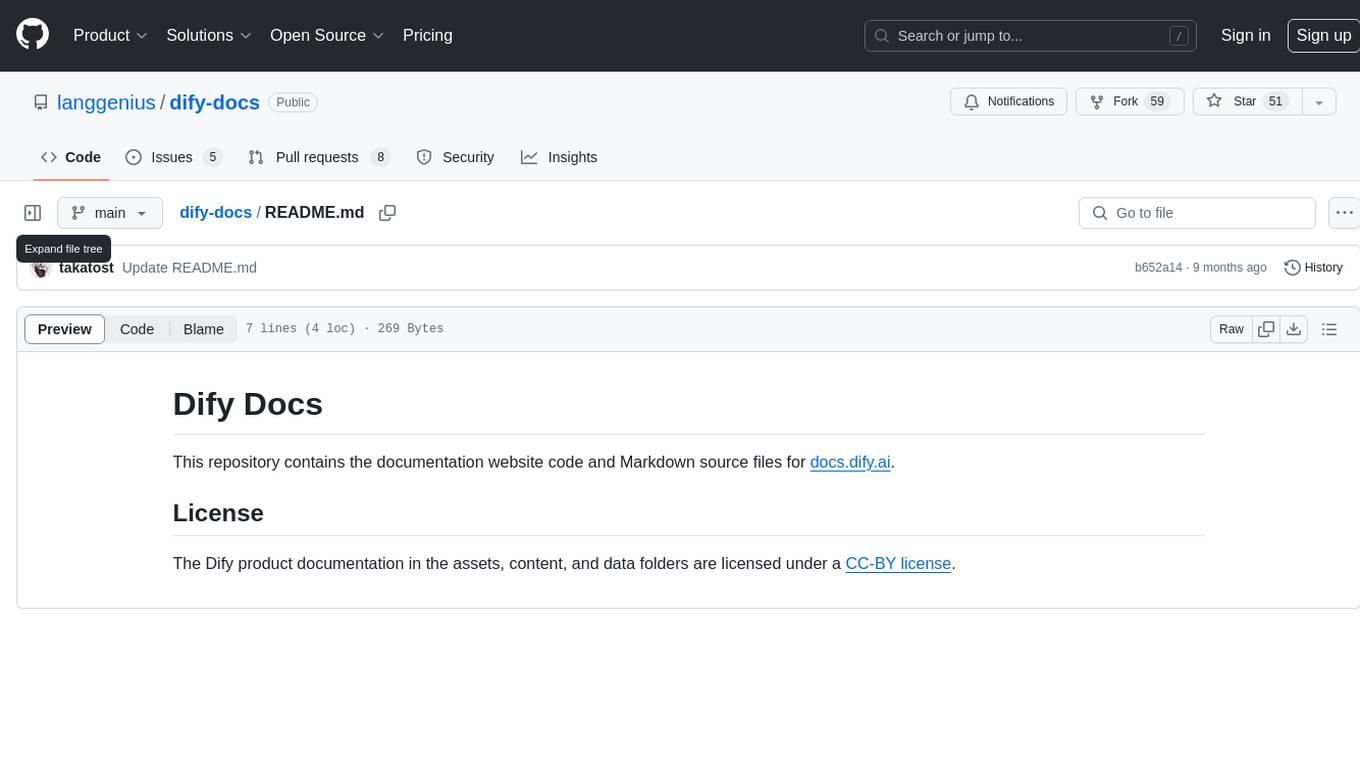
dify-docs
Dify Docs is a repository that houses the documentation website code and Markdown source files for docs.dify.ai. It contains assets, content, and data folders that are licensed under a CC-BY license.
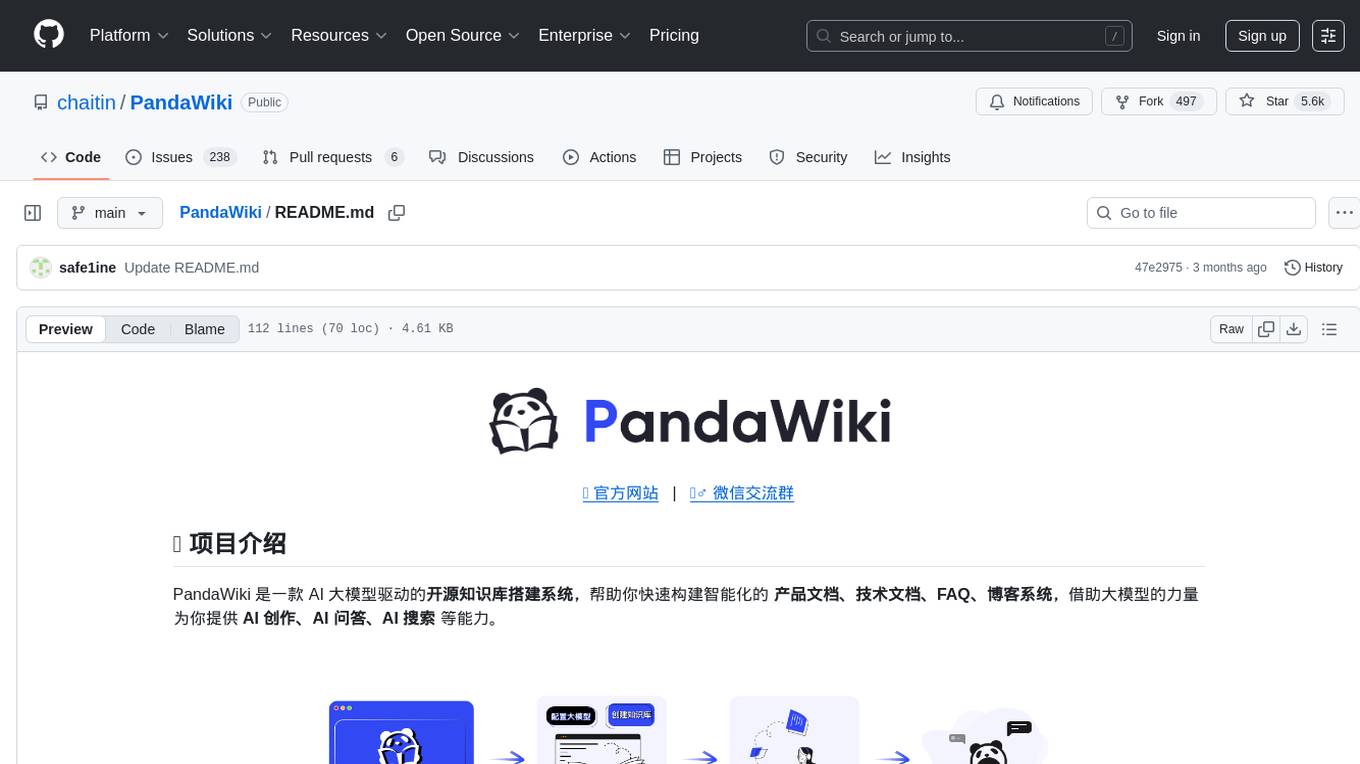
PandaWiki
PandaWiki is a collaborative platform for creating and editing wiki pages. It allows users to easily collaborate on documentation, knowledge sharing, and information dissemination. With features like version control, user permissions, and rich text editing, PandaWiki simplifies the process of creating and managing wiki content. Whether you are working on a team project, organizing information for personal use, or building a knowledge base for your organization, PandaWiki provides a user-friendly and efficient solution for creating and maintaining wiki pages.
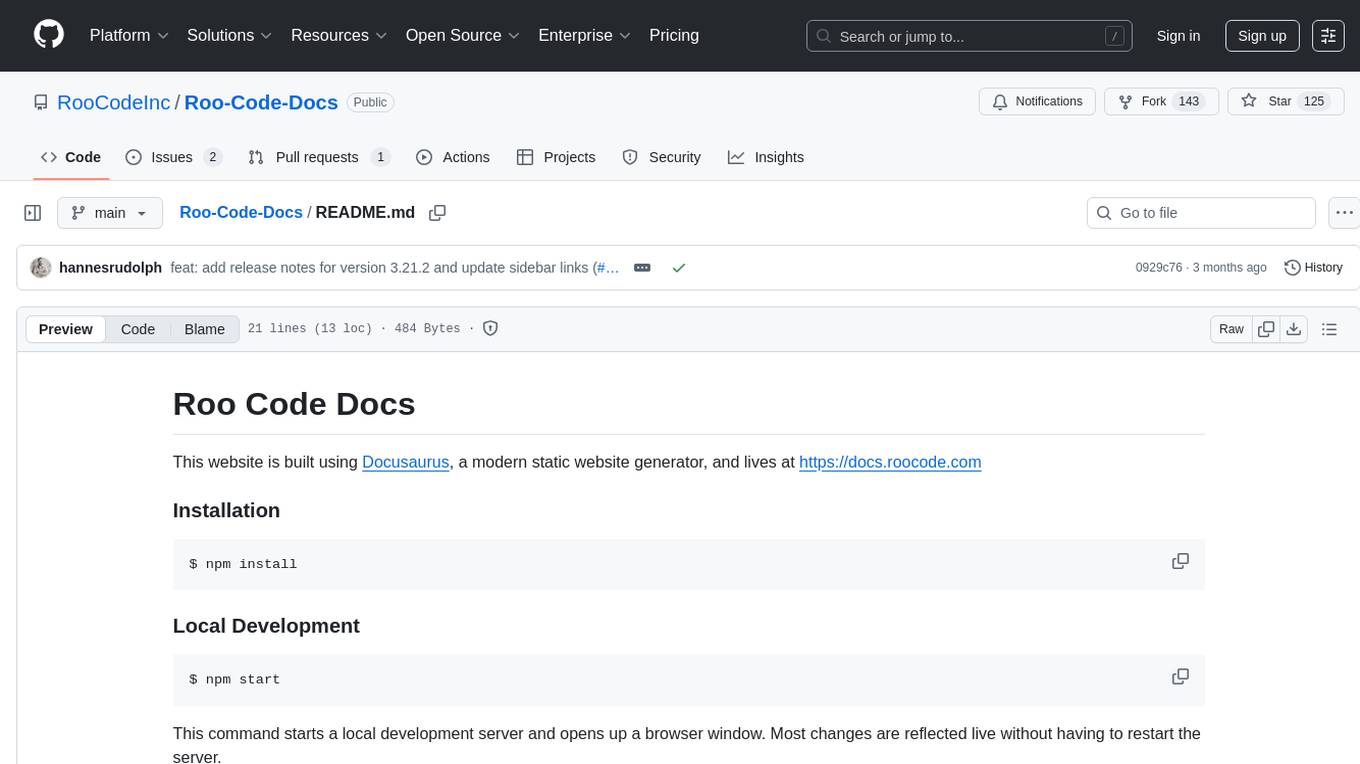
Roo-Code-Docs
Roo Code Docs is a website built using Docusaurus, a modern static website generator. It serves as a documentation platform for Roo Code, accessible at https://docs.roocode.com. The website provides detailed information and guides for users to navigate and utilize Roo Code effectively. With a clean and user-friendly interface, it offers a seamless experience for developers and users seeking information about Roo Code.
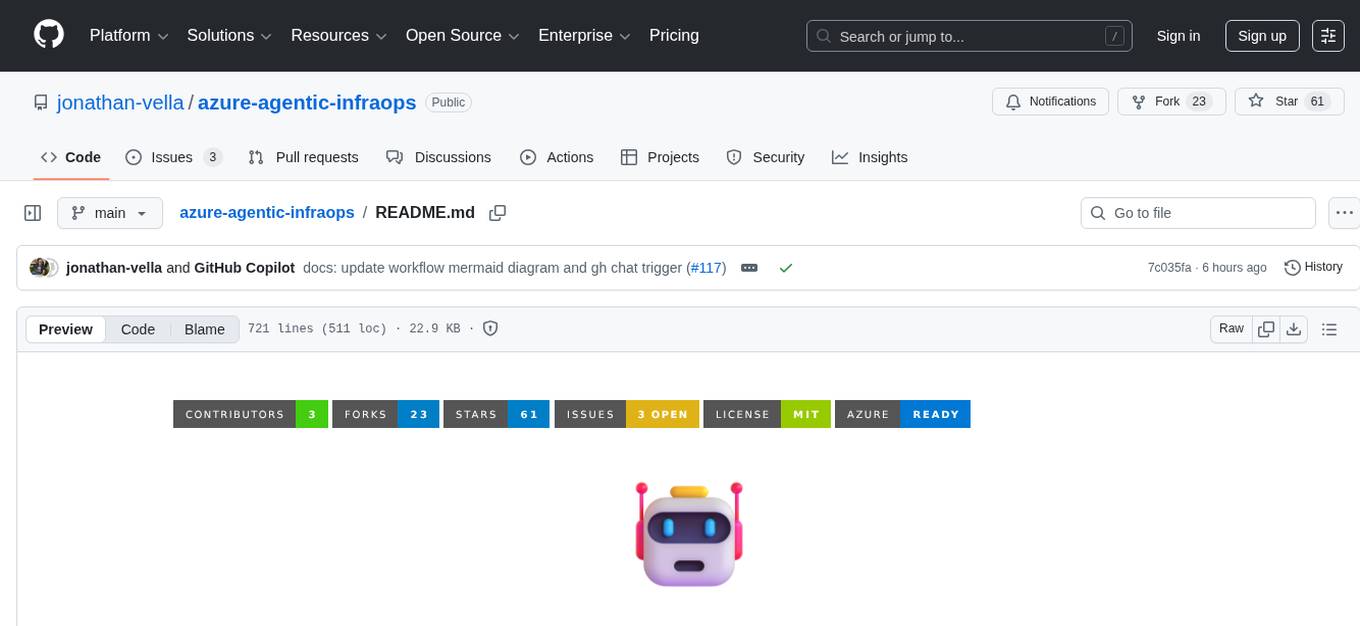
azure-agentic-infraops
Agentic InfraOps is a multi-agent orchestration system for Azure infrastructure development that transforms how you build Azure infrastructure with AI agents. It provides a structured 7-step workflow that coordinates specialized AI agents through a complete infrastructure development cycle: Requirements → Architecture → Design → Plan → Code → Deploy → Documentation. The system enforces Azure Well-Architected Framework (WAF) alignment and Azure Verified Modules (AVM) at every phase, combining the speed of AI coding with best practices in cloud engineering.
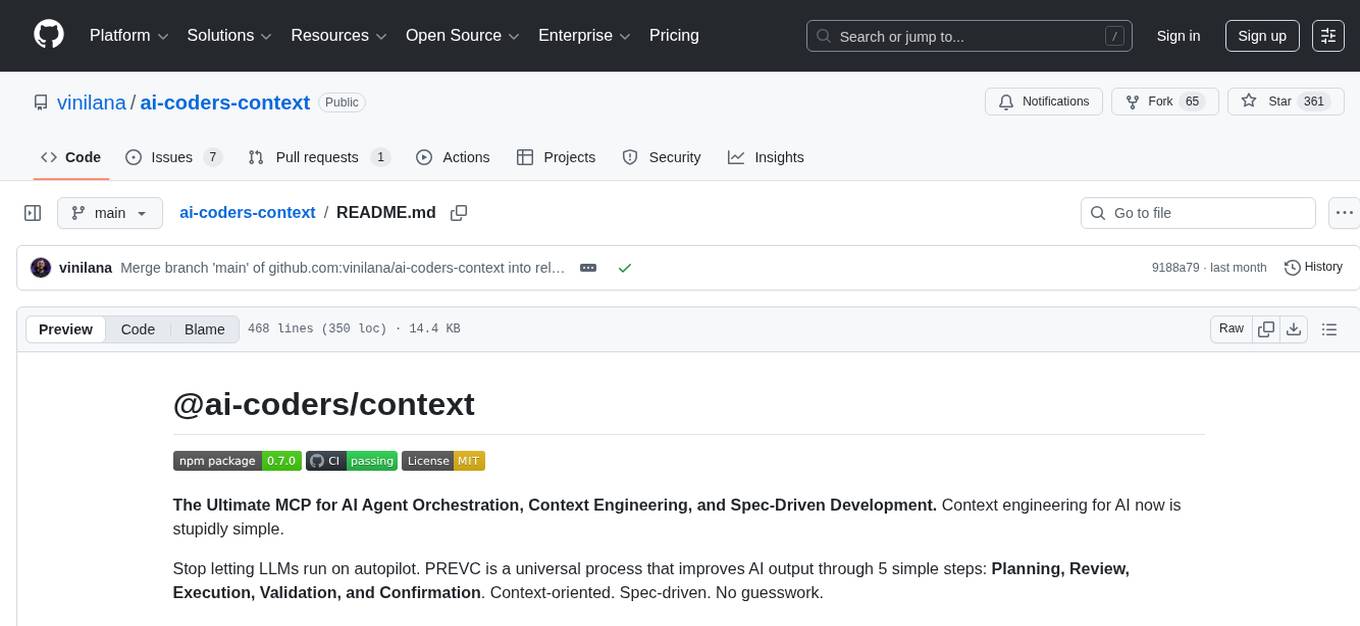
ai-coders-context
The @ai-coders/context repository provides the Ultimate MCP for AI Agent Orchestration, Context Engineering, and Spec-Driven Development. It simplifies context engineering for AI by offering a universal process called PREVC, which consists of Planning, Review, Execution, Validation, and Confirmation steps. The tool aims to address the problem of context fragmentation by introducing a single `.context/` directory that works universally across different tools. It enables users to create structured documentation, generate agent playbooks, manage workflows, provide on-demand expertise, and sync across various AI tools. The tool follows a structured, spec-driven development approach to improve AI output quality and ensure reproducible results across projects.
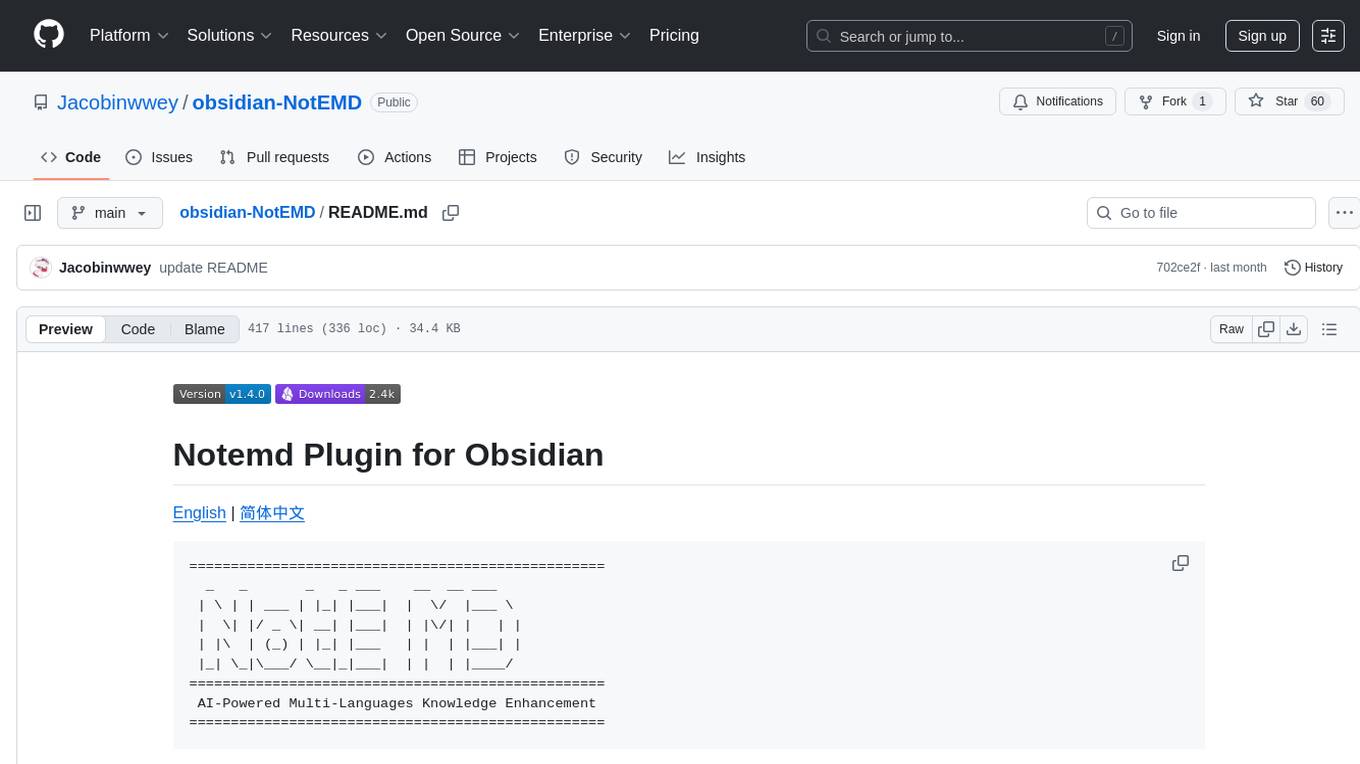
obsidian-NotEMD
Obsidian-NotEMD is a plugin for the Obsidian note-taking app that allows users to export notes in various formats without converting them to EMD. It simplifies the process of sharing and collaborating on notes by providing seamless export options. With Obsidian-NotEMD, users can easily export their notes to PDF, HTML, Markdown, and other formats directly from Obsidian, saving time and effort. This plugin enhances the functionality of Obsidian by streamlining the export process and making it more convenient for users to work with their notes across different platforms and applications.
For similar jobs

exif-photo-blog
EXIF Photo Blog is a full-stack photo blog application built with Next.js, Vercel, and Postgres. It features built-in authentication, photo upload with EXIF extraction, photo organization by tag, infinite scroll, light/dark mode, automatic OG image generation, a CMD-K menu with photo search, experimental support for AI-generated descriptions, and support for Fujifilm simulations. The application is easy to deploy to Vercel with just a few clicks and can be customized with a variety of environment variables.
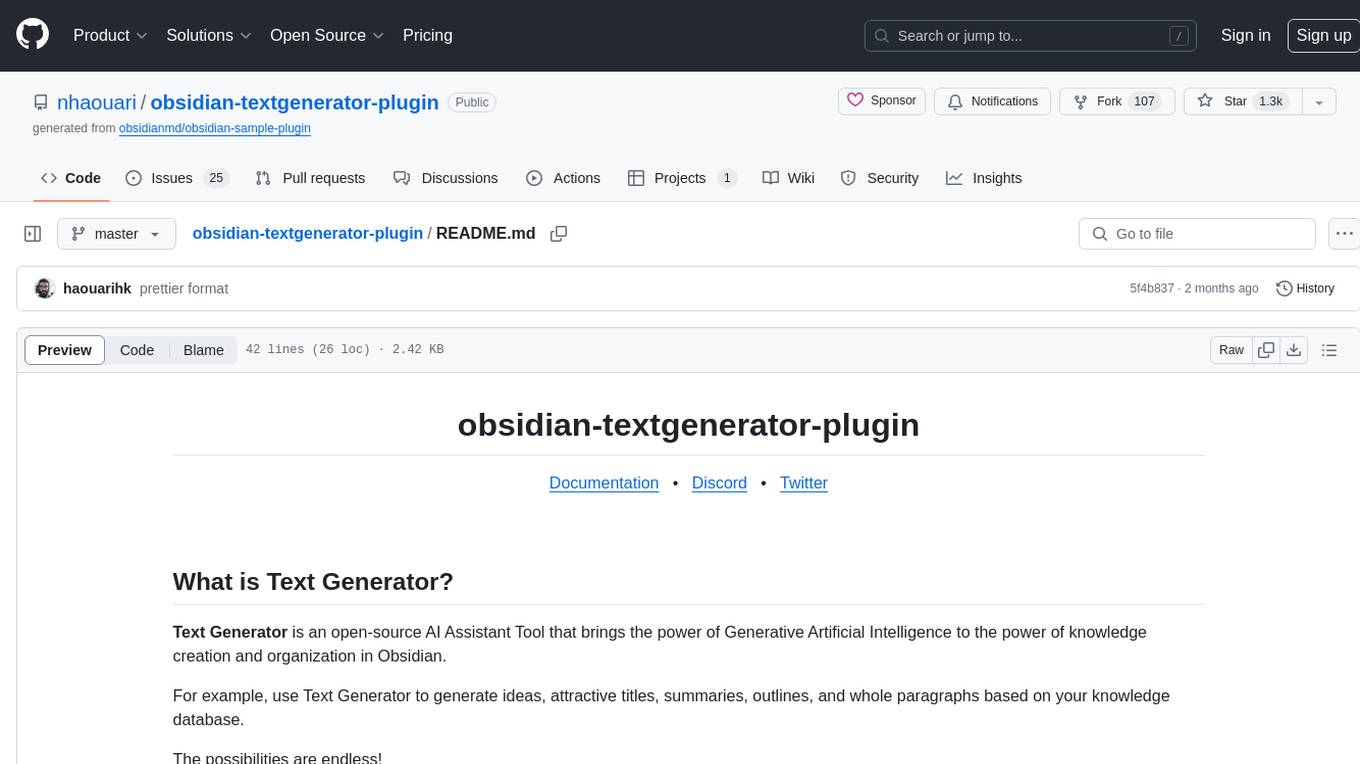
obsidian-textgenerator-plugin
Text Generator is an open-source AI Assistant Tool that leverages Generative Artificial Intelligence to enhance knowledge creation and organization in Obsidian. It allows users to generate ideas, titles, summaries, outlines, and paragraphs based on their knowledge database, offering endless possibilities. The plugin is free and open source, compatible with Obsidian for a powerful Personal Knowledge Management system. It provides flexible prompts, template engine for repetitive tasks, community templates for shared use cases, and highly flexible configuration with services like Google Generative AI, OpenAI, and HuggingFace.
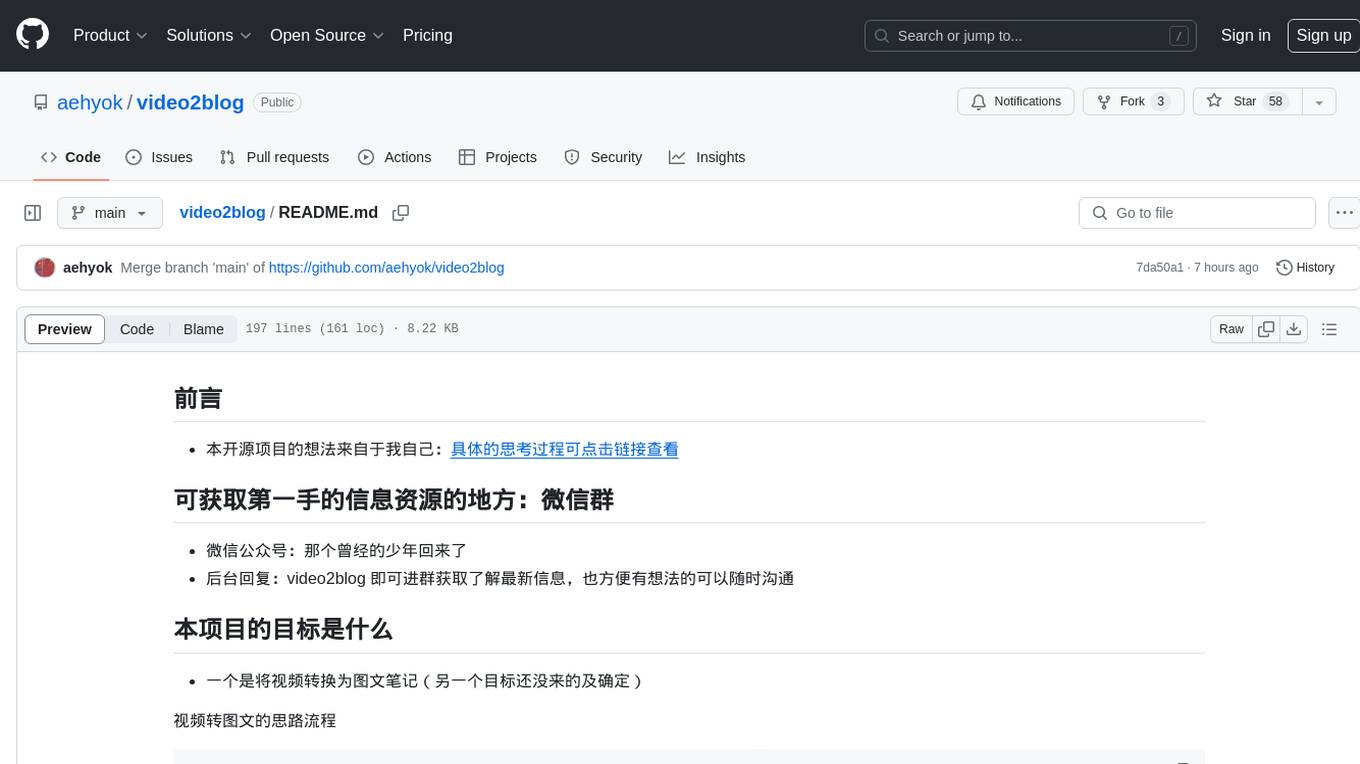
video2blog
video2blog is an open-source project aimed at converting videos into textual notes. The tool follows a process of extracting video information using yt-dlp, downloading the video, downloading subtitles if available, translating subtitles if not in Chinese, generating Chinese subtitles using whisper if no subtitles exist, converting subtitles to articles using gemini, and manually inserting images from the video into the article. The tool provides a solution for creating blog content from video resources, enhancing accessibility and content creation efficiency.
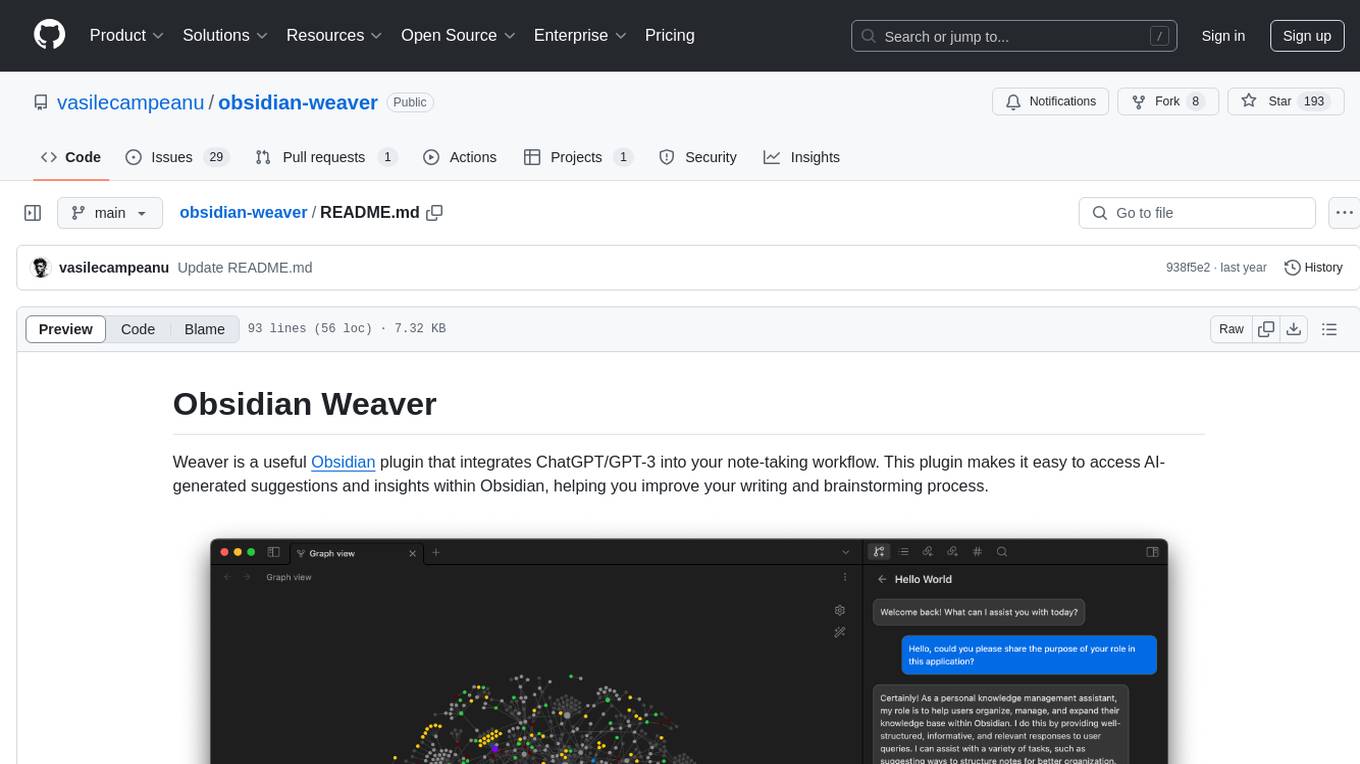
obsidian-weaver
Obsidian Weaver is a plugin that integrates ChatGPT/GPT-3 into the note-taking workflow of Obsidian. It allows users to easily access AI-generated suggestions and insights within Obsidian, enhancing the writing and brainstorming process. The plugin respects Obsidian's philosophy of storing notes locally, ensuring data security and privacy. Weaver offers features like creating new chat sessions with the AI assistant and receiving instant responses, all within the Obsidian environment. It provides a seamless integration with Obsidian's interface, making the writing process efficient and helping users stay focused. The plugin is constantly being improved with new features and updates to enhance the note-taking experience.
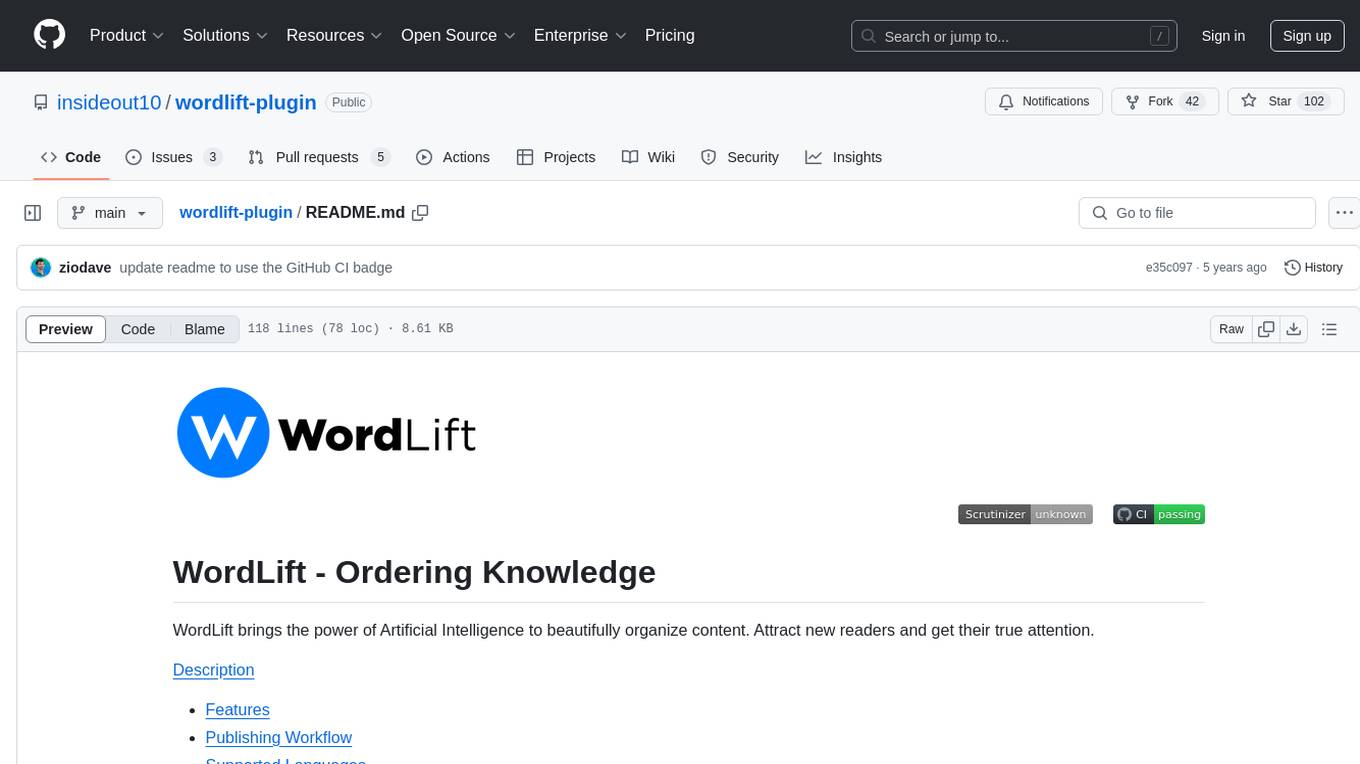
wordlift-plugin
WordLift is a plugin that helps online content creators organize posts and pages by adding facts, links, and media to build beautifully structured websites for both humans and search engines. It allows users to create, own, and publish their own knowledge graph, and publishes content as Linked Open Data following Tim Berners-Lee's Linked Data Principles. The plugin supports writers by providing trustworthy and contextual facts, enriching content with images, links, and interactive visualizations, keeping readers engaged with relevant content recommendations, and producing content compatible with schema.org markup for better indexing and display on search engines. It also offers features like creating a personal Wikipedia, publishing metadata to share and distribute content, and supporting content tagging for better SEO.
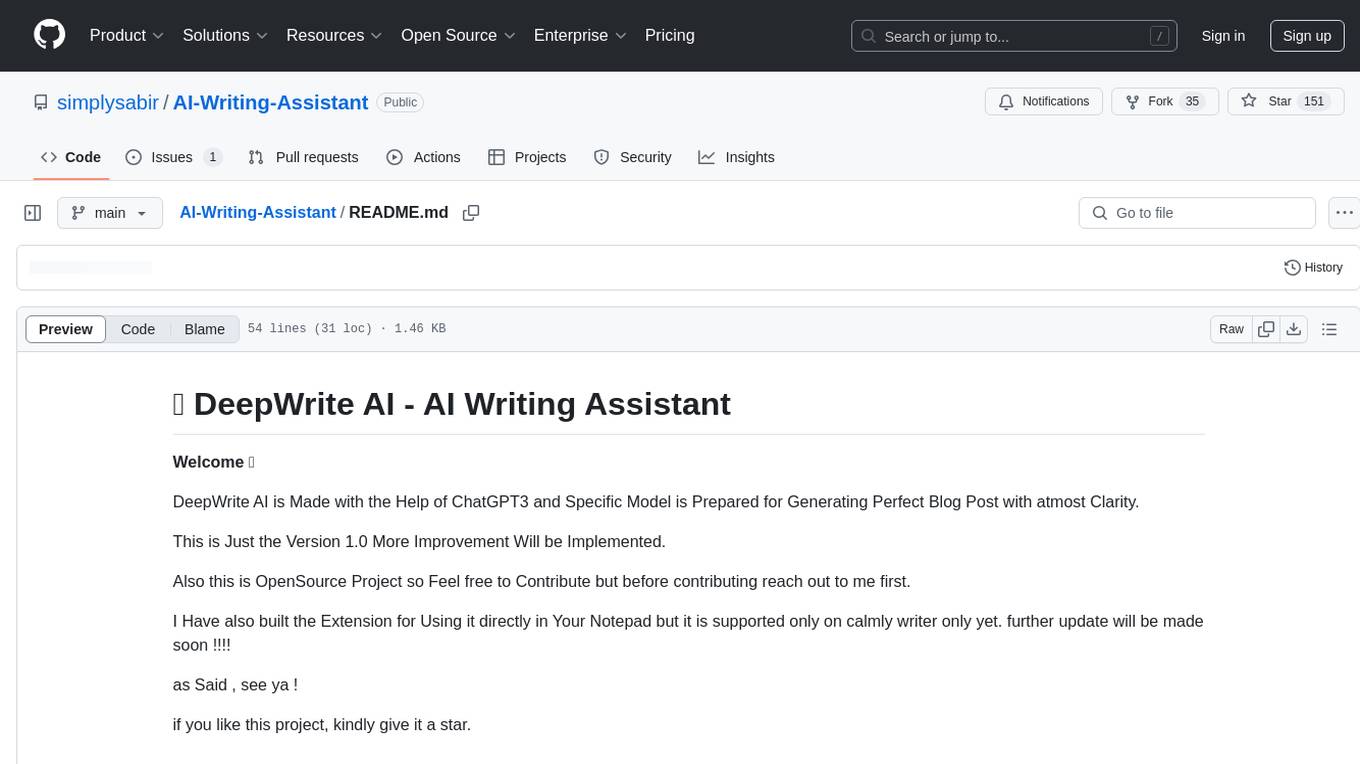
AI-Writing-Assistant
DeepWrite AI is an AI writing assistant tool created with the help of ChatGPT3. It is designed to generate perfect blog posts with utmost clarity. The tool is currently at version 1.0 with plans for further improvements. It is an open-source project, welcoming contributions. An extension has been developed for using the tool directly in Notepad, currently supported only on Calmly Writer. The tool requires installation and setup, utilizing technologies like React, Next, TailwindCSS, Node, and Express. For support, users can message the creator on Instagram. The creator, Sabir Khan, is an undergraduate student of Computer Science from Mumbai, known for frequently creating innovative projects.
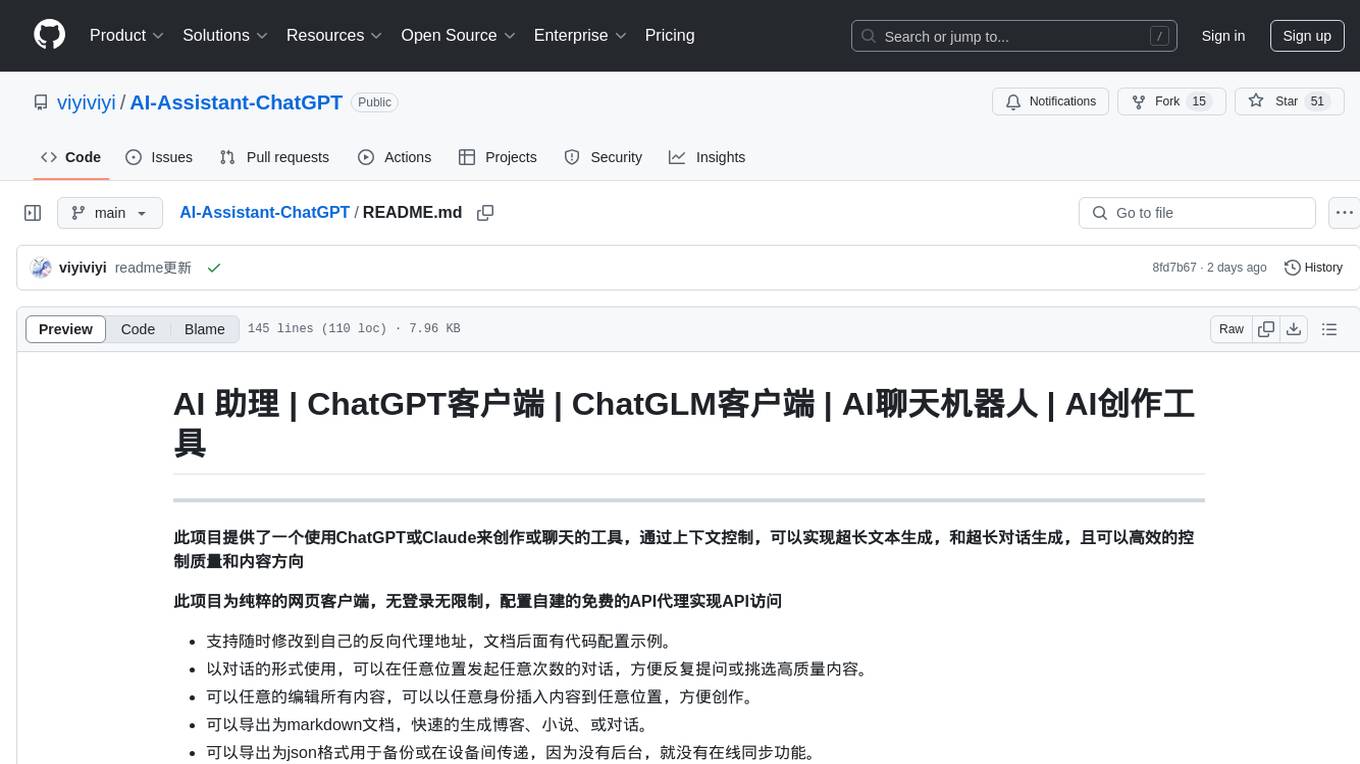
AI-Assistant-ChatGPT
AI Assistant ChatGPT is a web client tool that allows users to create or chat using ChatGPT or Claude. It enables generating long texts and conversations with efficient control over quality and content direction. The tool supports customization of reverse proxy address, conversation management, content editing, markdown document export, JSON backup, context customization, session-topic management, role customization, dynamic content navigation, and more. Users can access the tool directly at https://eaias.com or deploy it independently. It offers features for dialogue management, assistant configuration, session configuration, and more. The tool lacks data cloud storage and synchronization but provides guidelines for independent deployment. It is a frontend project that can be deployed using Cloudflare Pages and customized with backend modifications. The project is open-source under the MIT license.
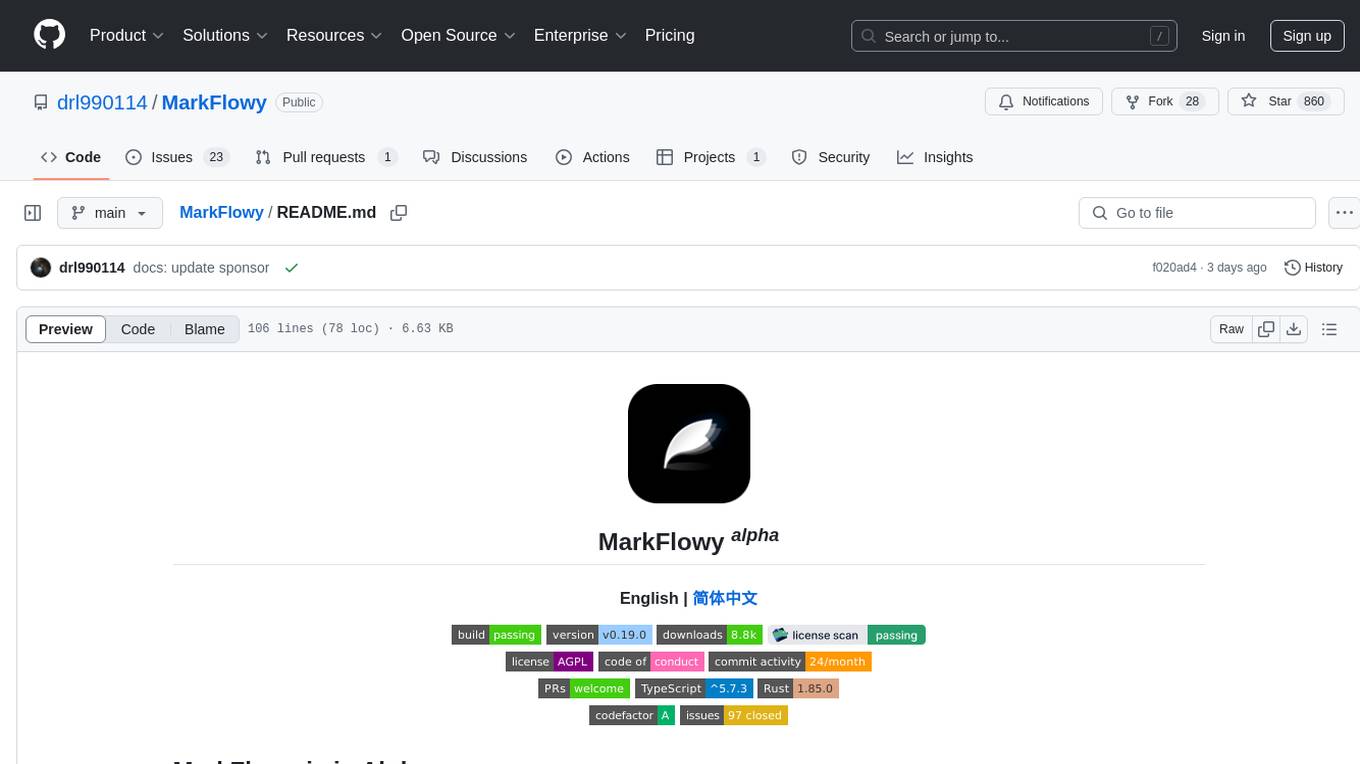
MarkFlowy
MarkFlowy is a lightweight and feature-rich Markdown editor with built-in AI capabilities. It supports one-click export of conversations, translation of articles, and obtaining article abstracts. Users can leverage large AI models like DeepSeek and Chatgpt as intelligent assistants. The editor provides high availability with multiple editing modes and custom themes. Available for Linux, macOS, and Windows, MarkFlowy aims to offer an efficient, beautiful, and data-safe Markdown editing experience for users.



